

In an interview with China Daily, Joe He, managing director and CEO of Australian Capital Equity Greater China, said that China's development of new quality productive forces promises a more efficient allocation of production factors globally and presents a unique opportunity for Chinese companies to enter international markets.

The realm of intellectual property will evolve with the development of artificial intelligence, said Daren Tang, director-general of the World Intellectual Property Organization, adding that he and his organization will continue to focus on placing "human creators and innovators" at the core of their work.
"AI is here to enhance and support human innovation, instead of replacing or destroying it," Tang told reporters last week on the sidelines of the Boao Forum for Asia Annual Conference 2024 in Boao, Hainan province.
In recent times, there has been a dramatic increase in the number of lawsuits involving copyright violation by AI in the areas of music, art, photography and writing.
This is not the first time that intellectual property systems are encountering big technological changes, Tang said. There was a similar scenario in the 1990s, with the rise of the internet and the creation of e-commerce, he added.
"I don't think AI will fundamentally change the intellectual property system," Tang said. To deal with challenges brought about by AI, the organization hosts regular conversations with representatives from 193 member states. It has also released two policy toolkits to help countries and companies to "navigate this difficult topic".
"We're looking forward to working with different partners, including Chinese partners, to support Chinese AI entrepreneurs, as well as use China's practices to support other countries," he said.
In 1973, the Chinese government sent its first delegation to Geneva for a WIPO meeting, and the country joined the organization in 1980. The two sides celebrated 50 years of cooperation last year.
Mature ecosystem
Tang said that joining the WIPO was an indication that China viewed innovation and technology as an important part of reform and opening-up.
"China, in the last 50 years, has shown tremendous growth and maturity in the intellectual property space," he said.
China is now the world's largest filer of intellectual property applications for everything from patents to trademarks, and from designs to the area of geographical indications, Tang said.
In 2023, the country filed 69,610 Patent Cooperation Treaty applications, becoming the largest origin of PCT filings. Tang said a lot of the filings are from the digital technology space. The country's telecom giant Huawei Technologies remained the top filer with 6,494 published PCT applications last year.
"I think that the achievements of China in the last 50 years, from a very basic to now a very mature ecosystem, are not the result of coincidence or chance", but because China has consistently placed high importance on intellectual property, he said, adding that WIPO is glad to see China's development in this area.
Citing his recent trip to Shenzhen and Guangzhou, both in Guangdong province, he said that Chinese enterprises are paying more attention to innovation and are investing a lot of resources into research and development.
In addition, local governments have also built the "right ecosystems" to encourage innovation and creativity, he said.
As the Chinese government is pursuing high-quality development, Tang said that innovation, technology and intellectual property will become even more crucial in the next stage.
The country also hopes to use intellectual property to contribute to addressing global challenges, such as climate change, which will help achieve the United Nations' Sustainable Development Goals, he said.
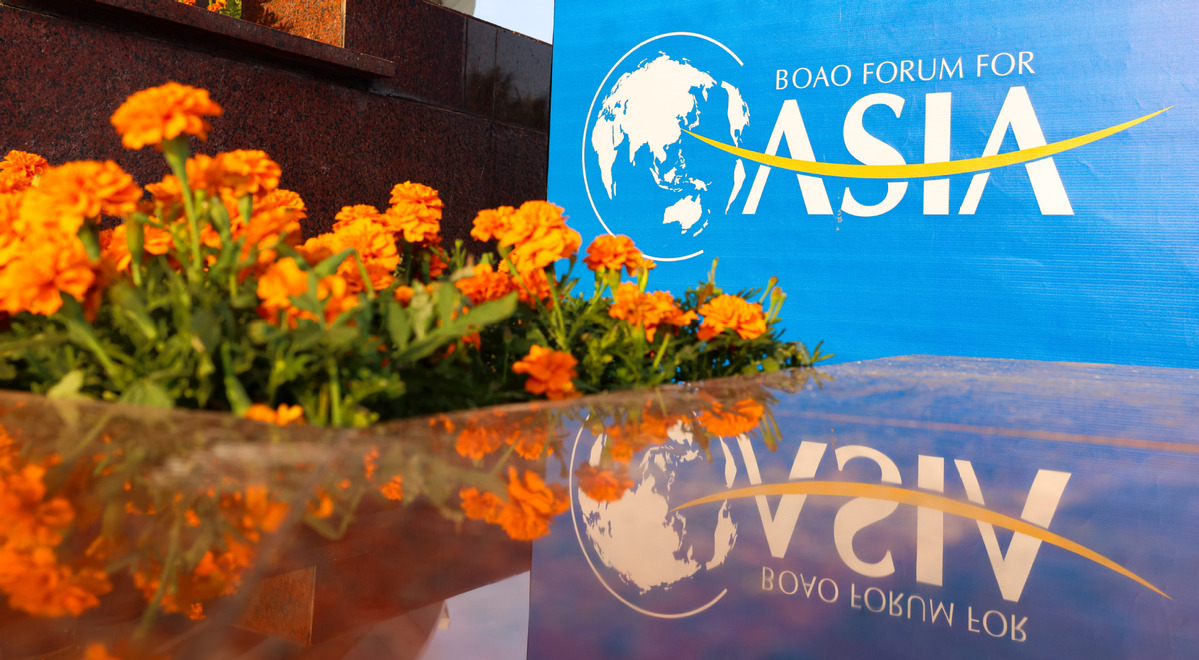
China's determination to achieve steadfast economic growth this year and its long-term vision to develop new quality productive forces are expected to inject fresh growth impetus into global economic development, said Zhang Donggang, Party secretary of the Renmin University of China, at the Boao Forum for Asia Annual Conference 2024 in Boao, Hainan province, that ended on Friday.
He took note of China's economic growth target of around 5 percent for this year, after growing by 5.2 percent last year despite a slowing global economy.
"China's economic growth target this year exceeded that of many developed economies, which sent a strong signal to the outside world that China's economy is resilient, has potential and development prospects, and can provide strong support for world economic recovery," Zhang said.
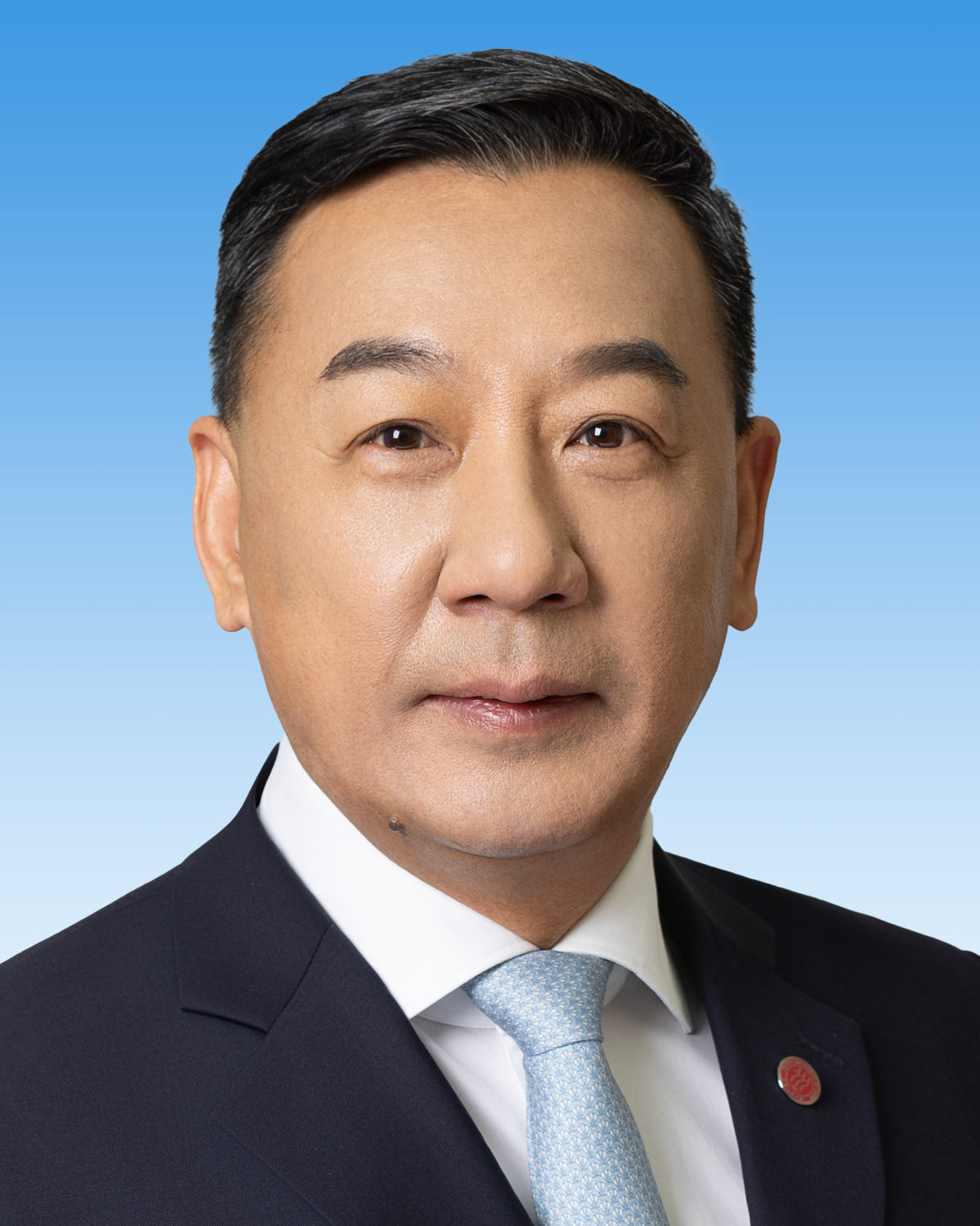
He said the 2024 GDP growth target also holds significance in guiding positive social expectations and restoring confidence in the domestic market, and also in providing investors and businesses with a clear development direction for more stable operations.
"The target also showed to the world that China is not lying flat, and the government is taking a more determined, proactive and assertive attitude in driving economic growth," he said.
Zhang said he believes the target is "achievable" and in line with the potential growth rate of the Chinese economy, as the country is pursuing high-quality development.
In January and February, China's major economic indicators showed a stable uptrend, with better-than-expected performance in industrial output and trade, he noted.
"They reflected that China's long-term economic fundamentals have not changed and embody the vigor and vitality of the Chinese economy."
To promote high-quality economic development, more efforts should be made to vigorously promote the construction of a modern industrial system and accelerate the development of new quality productive forces, Zhang said.
Compared with traditional productive tools that are driven by elements like labor, land and capital, new quality productive forces are driven by technological innovation, data, smart or intelligent technologies and the like.
"On the one hand, China should consolidate its advantages in some leading industries to maintain a sound foundation. On the other hand, the country should drive innovative development in frontier areas for industrial upgrade," Zhang said.
He further said it is important to construct supporting systems, establish platforms for development and undertake more reforms to unleash more potential.
"While developing new quality productive forces, talent is key. Universities serve as the high ground for supplying such talent. This requires universities to deploy an integrated approach that encompasses innovation chains, industrial chains, funding chains and talent chains.
"By cultivating a group of talented people in strategically important areas that possess innovative capabilities and a scientific spirit, universities are expected to provide strong impetus for the country's modernization and economic development."
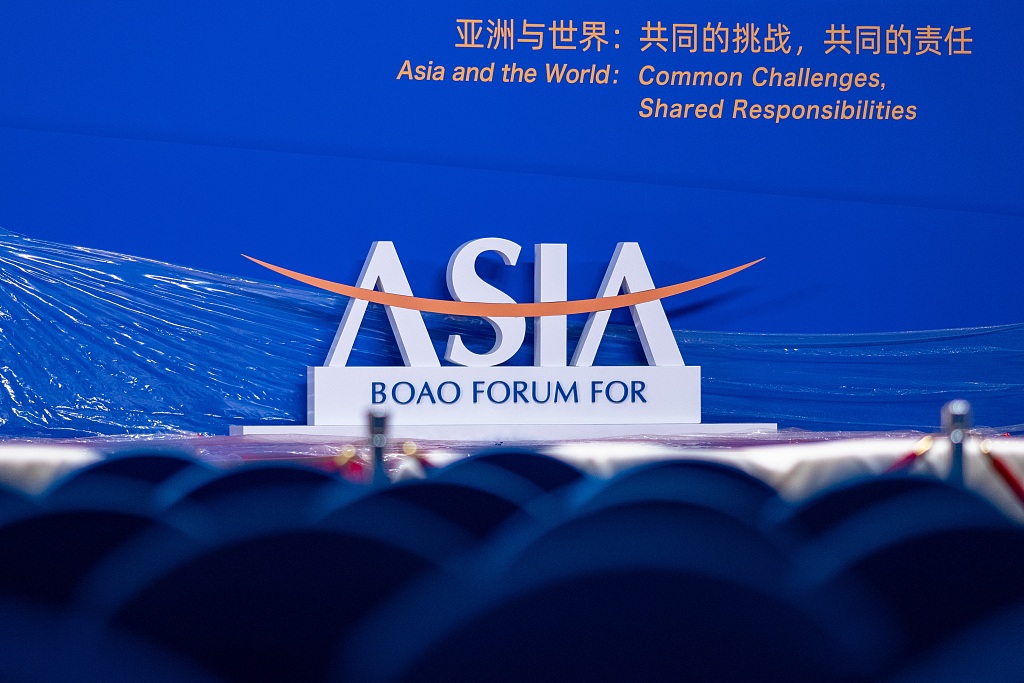
Green energy technology is integrated into Boao's Dongyu island, the permanent site of the Boao Forum for Asia in Qionghai, Hainan province.
Rooftop panels, floor tiles and even the curtain wall on the forum's media center are photovoltaic. Bustling roads are populated with renewable energy vehicles. Venues and hotel rooms are equipped by innovative water-cooled air-conditioning systems.
The Boao near-zero carbon demonstration area, covering 190 hectares on Dongyu island, started construction in 2022 and began operation on March 18, prior to the Boao Forum for Asia Annual Conference 2024, which concluded on Friday.
Hu Yaowen, head of the Hainan branch of China Academy of Urban Planning and Design, highlighted that the daily electricity consumption of the demonstration area stands at about 50,000 kWh per day. During the conference, the figure surges to around 90,000 kWh per day.
Under recent light conditions, Hu said, the demonstration area's daily electricity generation can reach 120,000 kWh, which is more than sufficient to meet the increased demand during the forum.
Meanwhile, photovoltaic power can be incorporated into the power grid and directly utilized for various purposes, according to Hainan Power Grid.
The photovoltaic panels on the roof of the New Power System Integration Exhibition System, for instance, are projected to generate 87,600 kWh of power annually. This saves around 28 metric tons of standard coal and reduces 87 tons of carbon dioxide.
In addition to pursuing green electricity supply, the demonstration area is focused on reducing energy consumption, particularly in the context of the tropical climate where air-conditioning plays a major role in carbon emissions and energy usage.
The high-efficiency chiller room at the Boao Asia Forum Hotel features rows of silver pipes forming the main air-conditioning system, circulating cold water to distribute cool air across the entire building.
Lu Di, an engineer from China Academy of Building Research, noted that the demonstration area can achieve a 10 percent reduction in the total energy consumption of buildings through the use of energy-efficient magnetic levitation frequency conversion units and a water storage system.
In the back kitchen of the hotel, head chef Liu Su uses an electromagnetic cooker to make a dish of fried shrimp, without the use of an open flame. Electrified kitchens not only enhance cooking safety but also allow for more precise heat control, ensuring the taste and cooking stability of the dishes, according to Liu.
Liu Lianwei, deputy director of the Department of Housing and Urban-Rural Development of Hainan province, emphasized the primary focus of the "zero carbon demonstration area" as achieving carbon neutrality, rather than eliminating emissions entirely. This means that through the integration of advanced emission reduction technologies in energy, construction, transportation and waste treatment, as well as the establishment of forest carbon sinks and offsetting measures, the region can balance carbon dioxide emitted with the amount absorbed.
Hainan aims to use the Boao near-zero carbon demonstration area to showcase its dedication to ecological sustainability and set a high bar for global environmental standards.
"It's a great idea to have a near-zero carbon demonstration area. This way, people from all over the world come, and they can see the latest technology in the area that China has to offer. We need to share with each other great solutions to reduce carbon output," said Carl F. Fey, an attendee of the forum and professor of strategy at BI Norwegian Business School.
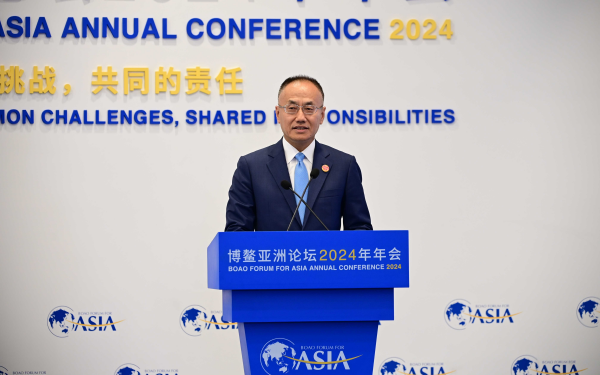
The pressing need of the international community to maintain peace and prevent conflicts is being addressed by the Global Security Initiative, or GSI, which provides feasible solutions to complex security challenges, observers have said.
Current major issues, including the conflict in the Middle East and rising tension in the Red Sea, have shown that the path to world peace and security remains long and arduous, said Vice Minister of Foreign Affairs Chen Xiaodong.
The GSI proposed by China is committed to resolving conflicts and differences, and seeking solutions for people suffering because of those situations, Chen said during a panel discussion at the Boao Forum for Asia Annual Conference 2024.
The goal of the initiative is to respect each and every country, and to ensure the security of nations, instead of seeking dominance in international security affairs or asking others to pick sides, he said.
Chen said more and more countries have realized that the GSI is not China's tool in geopolitical contests, but an international public good from which all parties can benefit.
The GSI does not seek to build a "small yard and high fence", nor does it target or exclude any particular country, he said.
"We welcome all interested countries to the GSI and support all efforts conducive to global peace and stability with an open mind," he added.
Sarybay Kairat, secretary-general of the Conference on Interaction and Confidence-Building Measures in Asia, or CICA, said the GSI is conducive to handling conflicts between countries, and a cornerstone in promoting trust and dialogue.
During this challenging time, the initiative offers a compelling and realistic framework for resolving disputes between nations through peaceful dialogue, and under the current circumstances of geopolitical fraction, multilateralism and inclusiveness stand as the only viable pathways toward peace and stability, he said.
"I strongly believe that the synergy between CICA objectives and GSI goals can foster a safer, more prosperous and interconnected world by addressing common challenges through collective action and dialogue," he said.
Zhang Ming, secretary-general of the Shanghai Security Cooperation, or SCO, said the GSI philosophy is highly consistent with the spirit and principles of the SCO, which has injected impetus into the organization's efforts to uphold regional peace and stability and in promoting political settlement of international and regional hotspot issues.
The SCO is ready to work with like-minded friends to promote traditional and non-traditional responses to security challenges in the spirit of the GSI, so as to promote the development of a more just and equitable international order and safeguard world and regional peace and security, he said.
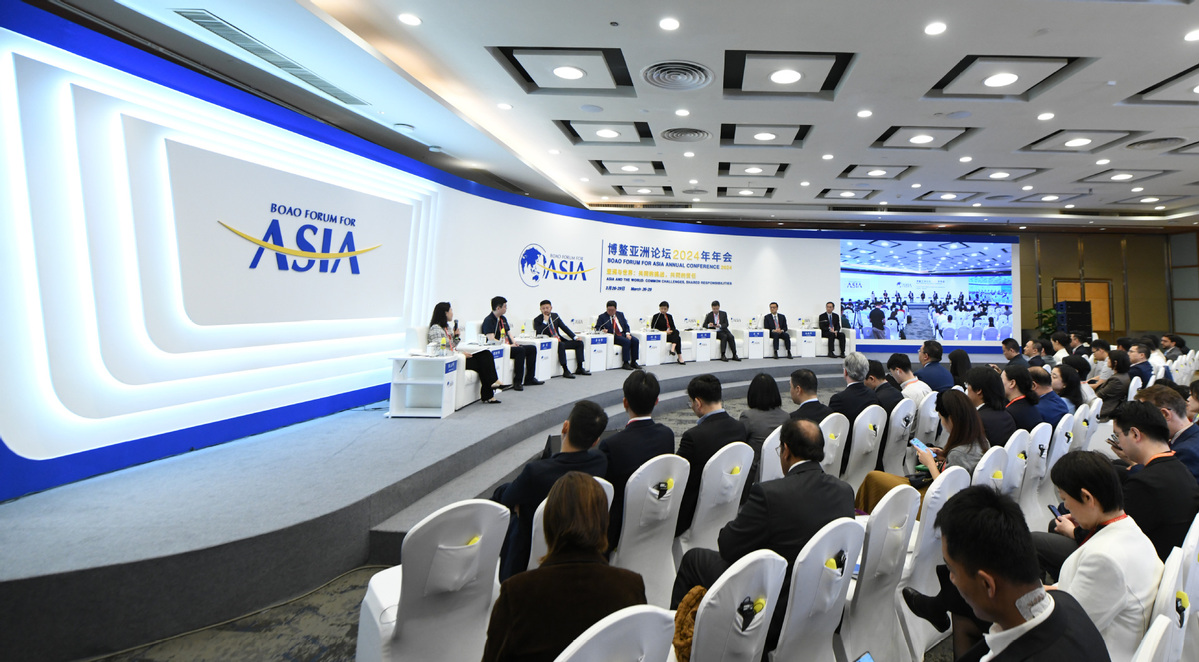
BOAO, Hainan - While highlighting the remarkable achievements unlocked by the Belt and Road Initiative (BRI), participants at the Boao Forum for Asia (BFA) Annual Conference 2024 also called on participating countries to strengthen cooperation in technological innovation and the digital economy.
Since its inception in 2013, the China-proposed BRI has reaped substantial benefits from deepening the "hard connectivity" of infrastructure and the "soft connectivity" of technology, to coordination of standards and rules in its participating countries, said attendees at a panel discussion on high-quality Belt and Road cooperation on Friday.
The BRI has launched thousands of projects in around 150 countries and regions over the past years, providing financial and technological assistance as well as bringing people tangible benefits, said Zafar Uddin Mahmood, policy advisor to the secretary general of the BFA.
For Pakistan, one of the biggest beneficiaries of the BRI, former prime minister of Pakistan Shahid Khaqan Abbasi said that the initiative and the China-Pakistan Economic Corridor have promoted mutually beneficial cooperation in energy, transportation and other fields in the two countries.
The purpose of the initiative is to promote shared development and prosperity for participating countries, said Renat Bekturov, governor of Astana International Financial Centre, adding that China is now leading technological innovation in many sectors, and sharing these technologies will be win-win for all the BRI participating countries.
Data showed that from 2013 to 2022, the cumulative value of trade between China and BRI partner countries reached $19.1 trillion, with an average annual growth rate of 6.4 percent. Cumulative two-way investment between China and partner countries reached $380 billion, including $240 billion from China.
While praising the fruitful results of the initiative thus far, participants at the panel discussion also emphasized the role of the "Digital Silk Road," the technology dimension of the initiative, in promoting economic transformation and industrial restructuring in the BRI partner countries.
The "Digital Silk Road" project is important for the overall development of BRI participating countries, as well as for the initiative itself, said Suma Chakrabarit, former president of the European Bank for Reconstruction and Development, noting that the project should strengthen cooperation and sharing of digital technology, help local people access digital technology, and enhance their innovation capability.
His opinions were echoed by Jin Liqun, president and chair of the Board of Directors of the Asian Infrastructure Investment Bank, saying that the construction of digital infrastructure is critical, and project sponsors must consider the digital factor in the future investment.
There exists a digital gap as low-income countries are weak in digital infrastructure and efforts should be made to improve their digital interconnection capability, he added.
The world is facing various challenges during the promotion of digital technology such as artificial intelligence considering its legal and ethical uncertainties, which need the common efforts of BRI partner countries to deal with, said Abbasi.
The BFA Annual Conference 2024 drew some 2,000 participants from March 26 to 29 in Boao, a resort town in Hainan province, South China. Founded in 2001, the BFA is a non-governmental and non-profit international organization committed to promoting regional economic integration and bringing Asian countries closer to their development goals.
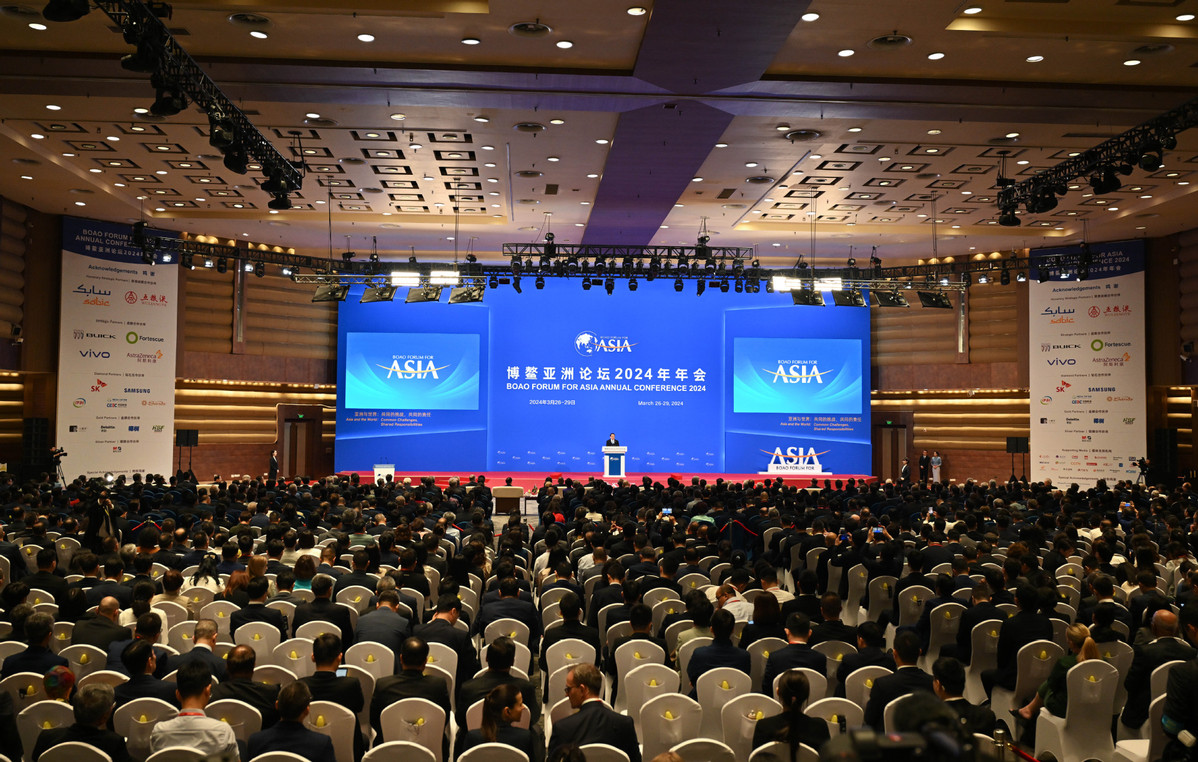
BOAO, China - In an era fraught with formidable global challenges, the remarkable resilience of China's economy and the collective achievements made across Asian economies have grabbed global attention during the ongoing the Boao Forum for Asia (BFA) Annual Conference 2024 held in Boao, a resort town in China's southernmost island province of Hainan.
With participants from over 60 countries and regions as well as keen observation from experts worldwide, the forum, running from March 26 to 29, has seen a growing confidence in the shared opportunities brought by China's sustainable economic growth and its high-quality development.
"China has been focusing on a higher quality rather than greater quantity growth for a number of years," Ben Simpfendorfer, a partner at leading international management consulting firm Oliver Wyman, told Xinhua on the sidelines of the ongoing event.
As a global manufacturing hub, China's economy matters a great deal to the rest of the region, said Ben, noting the benefits from investments into innovation are already evident via China's increased exports of new energy vehicles, among others.
"We need to tap into innovation-led growth globally, we need to develop new clean technologies in order to support the transition or support the climate transition," Ben said, stressing China's role as the global innovation hub for clean technology.
"China's stable economic growth is a boon not only to China itself but also to the rest of the world, particularly to poor and developing countries," Kin Phea, director general of the International Relations Institute of Cambodia, a think tank under the Royal Academy of Cambodia, told Xinhua ahead the BFA.
"As the global manufacturing hub and the stabilizer of global value chains, China's economic growth is essential to help boost (the) global economy," said Phea.
Making strides in new quality productive forces, which feature high-tech, high efficiency, and high quality, is high on China's agenda this year, which Phea said perfectly aligns with the rapidly evolving digital era.
"Its connotation implies a substantial increase in overall productivity," Phea said, noting that "new technologies, industries, and business models will not only bring forth new opportunities and transformations to reshape China's economy but also have a broader impact on the economic landscape of the Asian region."
Phea was echoed by Ip Kuai Peng, pro-rector of the City University of Macao, who told Xinhua that the new quality productive forces "will drive the Chinese economy and the entire Asian region toward a more efficient, intelligent, green, and open direction, promoting economic structural adjustments and technological innovation in various countries, and achieving sustainable and high-quality economic growth."
On the China-proposed Belt and Road Initiative (BRI), Zafar Uddin Mahmood, policy advisor to the secretary general of BFA, shared his personal experience with other panelists and participants on Wednesday. As a Pakistani, he is familiar with Pakistan's involvement in Belt and Road cooperation with China, which have assisted in the development of Pakistan's energy and transportation sectors.
"What's remarkable is that amidst such rapid progress, China manages to prioritize green initiatives, innovation, and high-quality development," said Mahmood.
With sustained double-digit growth in R&D investment, innovation in China is on the rise. China's high-tech sector boasts around 400,000 enterprises, ranking second globally in terms of unicorn companies.
"China's science and technology innovation and development not only speed up China's economic transformation, accelerate the development of new quality productive forces, optimize and enhance China's position in the global industrial chain and value chain, but also promote global scientific and technological development," said Koh King Kee, president of Center for New Inclusive Asia, a non-governmental Malaysian think tank.
"Through the optimization of the industrial chain, China's manufacturing industry has transformed from low-end to high-end, promoted the adjustment and upgrading of the global industrial structure, accelerated the global digitalization process, and helped to narrow the digital divide between developing countries and developed economies," he added.
On the theme of "Asia and the World: Common Challenges, Shared Responsibilities," this year's BFA hopes to pool the wisdom of all parties and the strength of Asia and beyond, overcome difficulties, and create a better future.
Global awareness of climate change and ensuing consequences has surged in recent years, immediate action in this regard across the world is more imperative than ever, a call echoed by international climate negotiators, scientists, and enterprises at the ongoing Boao Forum.
"Discussions on climate change and China's green development are prevalent, with each director of the Boao Forum emphasizing green development and the common challenges faced by humanity," Leon Wang, executive vice president, international and China president at AstraZeneca, told Xinhua on the sidelines of the BFA.
Deeming China a world leader in green development that is steadfast in implementing initiatives related to green development, Wang said the country "not only fulfills its commitments to the world but also continually exports new technologies, contributing to global new energy and green development."
"China has to be complimented in its success in introducing products and technologies that are addressing the serious problem of climate change," Bernardo M. Villegas, professor at the University of Asia and the Pacific, told Xinhua in an interview ahead of the BFA.
"By exporting these products to emerging markets, its contribution to a greener world will be even enhanced," the economist added.
Fu Xiao, head of commodity Markets Strategy at Bank of China's Investment Banking Group (BOCI) Global Commodities (UK) Ltd, told Xinhua that China's development in green areas, such as new energy vehicles, clean energy, and digital technology will provide vast market space and business opportunities for global enterprises, driving the optimization and upgrading of the global industrial chain.
"By investing in emerging industries and green technologies, nations can collectively tackle global challenges such as climate change and environmental pollution, injecting new impetus into global economic growth and promoting prosperity," said Fu.
The climate is universal, climate transcends all borders, thus the world has to collaborate and is collaborating, said Tim Wilkinson, ambassador at large and special envoy office of the President Patriotic Union of Kurdistan.
"When I arrived at Haikou airport, I was driven in an electric car to the Boao forum. When I got up in the morning to come to the forum, I was again driven by an electric car ... I've seen the efforts by the forum to reduce carbon for the conference itself," Wilkinson told Xinhua.
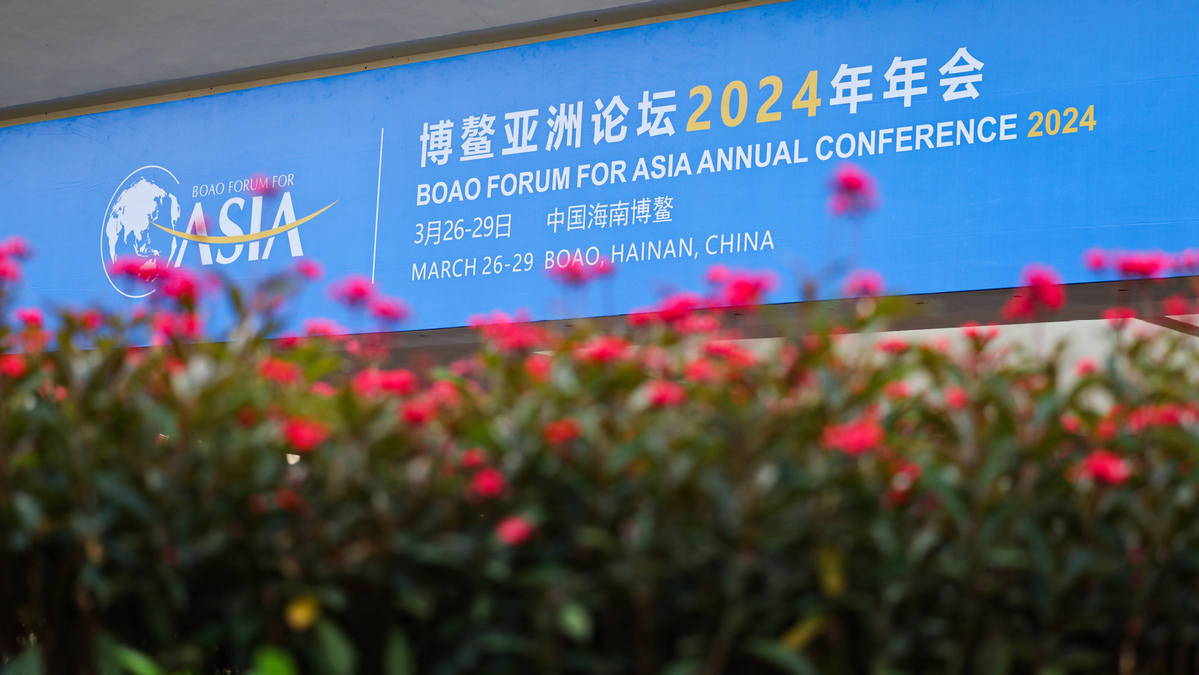
BOAO, Hainan - The Boao Forum for Asia (BFA) Annual Conference 2024 concluded Friday in Boao, a coastal town in China's island province of Hainan, with a series of consensus reached.
"All parties are more aware of the challenges facing the world today," said Li Baodong, BFA secretary general at the closing press conference, adding that all countries are encountering common challenges including the sluggish global economic recovery and the persistence of regional conflicts. "Only by working together can we better handle the challenges."
Asia is leading a new era of sustainable development, and China is the pillar of sustainable development of the world economy in the post-COVID-19 era, he noted.
China is advancing high-quality development and further opening up, and the country is expected to remain the largest contributor to global economic growth, he said.
The consensus also underscores that innovation is the inexhaustible driving force for development, and countries around the world should accelerate actions on climate change.
The BFA annual conference this year took place from March 26 to 29, with the theme "Asia and the World: Common Challenges, Shared Responsibilities."
The conference drew about 2,000 delegates from over 60 countries and regions and more than 1,100 journalists from nearly 40 countries and regions.
Founded in 2001, the BFA is a non-governmental and non-profit international organization committed to promoting regional economic integration and bringing Asian countries closer to their development goals.
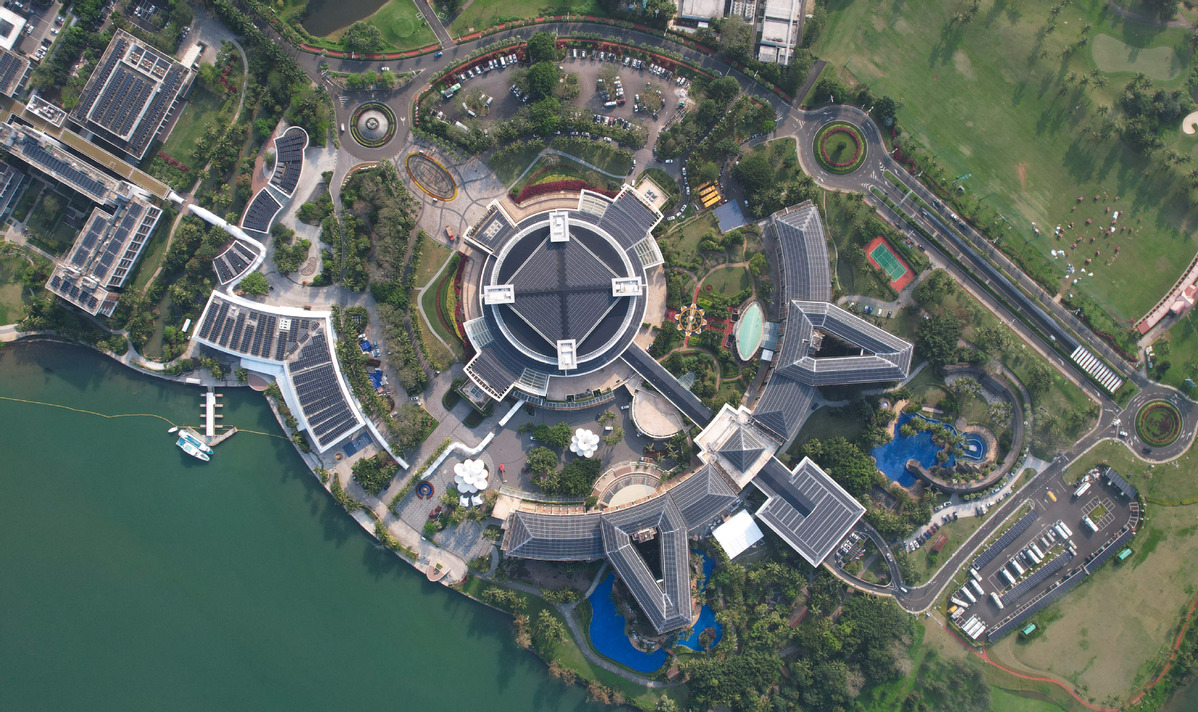
BOAO, Hainan - Energy company executives attending the Boao Forum for Asia Annual Conference 2024 in Boao, South China's Hainan province, have pledged aggressive plans while also calling for more global cooperation to help accelerate energy transition.
At a sub-forum titled "Low Carbon Energy Transformation" held in Boao on Friday, Huang Yongzhang, president of PetroChina, revealed that China's largest oil and gas producer is actively developing its new energy business amid the country's green drive.
New energy is becoming one of PetroChina's main businesses, and is expected to account for 7 percent of its total output in 2025 and for one-third in 2035, according to Huang.
This is just one example of China's vigorous green transition as it pursues its dual carbon goals of peaking carbon emissions by 2030 and reaching carbon neutrality by 2060.
After years of robust investment, China's total installed renewable energy capacity had topped 1,516 GW at the end of 2023, according to the National Energy Administration. This figure accounted for 51.9 percent of China's total installed power generation capacity and represented nearly 40 percent of global installed renewable energy capacity.
This progress on the path to a greener China followed the fast growth of China's new energy equipment industry, which has greatly slashed costs and made renewable energy more affordable.
China is a major producer of green energy equipment. It supplies 50 percent of the world's wind power equipment and 80 percent of global photovoltaic equipment.
After heavy investment in renewable energy, the proportion of electricity generated by wind and solar power in China has grown rapidly over the past few years, according to Zhong Baoshen, chairman of LONGi Green Energy Technology Co, Ltd.
Over the past more than 10 years, China's PV industry has made great contributions to global low-carbon energy transformation, Zhong said when addressing the panel discussion.
In response to the protectionism being applied in some countries, Zhong called for more cooperation to address challenges facing global energy transition and the impact of climate change.
"Only through global cooperation and the optimization of the allocation of resources through free trade can we accelerate this transformation and make it cheaper," Zhong said.
Zhong also touched on concerns regarding supply chain security, calling for closer cooperation between countries, the building of mutual trust and continued work to ensure long-term free trade.
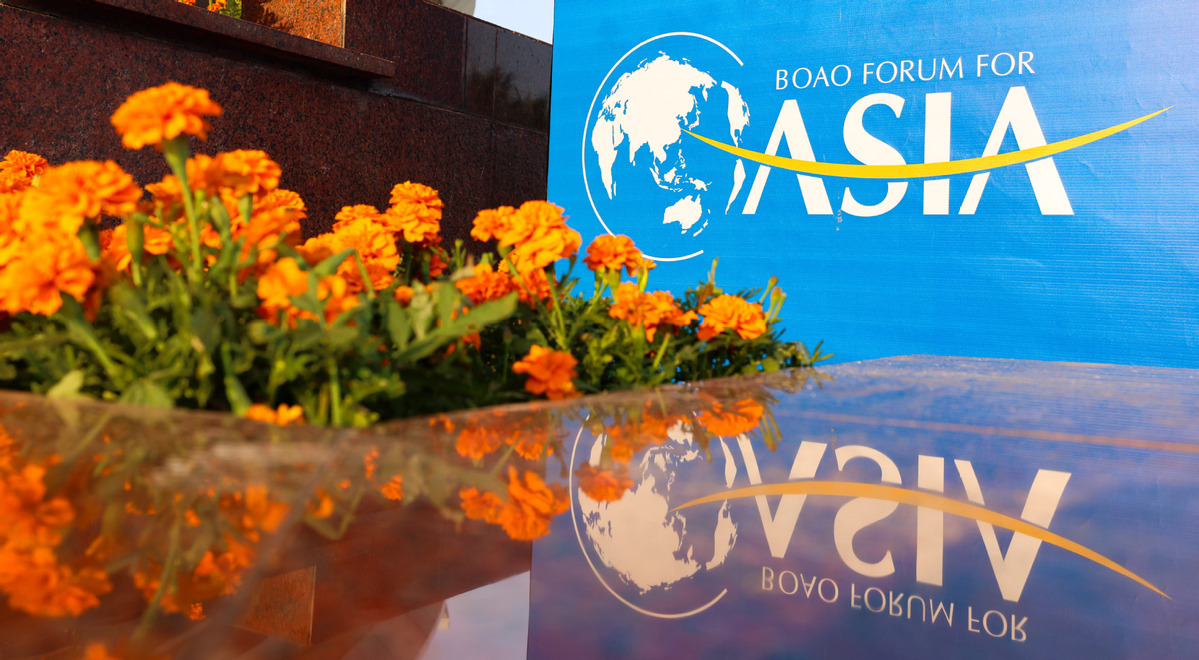
BOAO - The high-quality development pursued by China amid its drive to grow new quality productive forces will continue to unleash great potential for growth and business opportunities for multinational companies, according to distinguished speakers at the Boao Forum for Asia (BFA) Annual Conference 2024.
The speakers were attending a panel discussion on the outlook of the Chinese economy during the conference, which runs from March 26 to 29 in Boao, a resort town in southern China's Hainan province.
During the fast-paced hour-long session, the discussion was kicked off with mention that the world's second-largest economy achieved 5.2 percent growth last year, despite the economy being weighed down by the real estate sector and a sluggish global economy, with the panelists agreeing it was not "too bad."
They also made one point crystal clear -- strong and sustainable growth in China holds great significance for both the country, and the world.
"Last year, China by itself contributed around one third of global growth. Our research also shows that for every one percentage point faster in China's growth, that raises on average the level of GDP in other economies in the medium term by about 0.3 percent," said Steven Alan Barnett, senior resident representative in China of the International Monetary Fund (IMF).
When commenting on China's economic performance last year, "solid" and "outstanding" were the two words used by Vivian Jiang, Chair of Deloitte China. "Even though the Chinese economy grew at a lower rate compared to years ago, what needs to be seen is that the quality of growth in China continues to improve."
"For instance, the growth of expenditures on research and development in China last year rose by 8.4 percent year-on-year, which was a much faster growth compared to the GDP growth, and this is important data for us as a professional services agency. The fast R&D spending growth means continued momentum for the Chinese economy going forward," she said.
The Chinese government has set an economic growth target of around 5 percent for 2024. "The 5 percent growth target, I believe, is a goal China can achieve. In the first two months of this year, we already saw that most economic indicators were a lot better compared to the same period last year," said Liu Qiao, professor of finance and dean of Guanghua School of Management, Peking University.
Government data showed that in the first two months of 2024, China saw its imports and exports reach 6.6 trillion yuan ($930 billion), a historical high for the same period. Meanwhile, some 7,160 new foreign-invested firms were set up across China during the same period, up 34.9 percent year-on-year, the highest increase in nearly five years.
Liu said that the data from the beginning months of the year to some extent helped shore up confidence in the Chinese economy's overall growth for the whole year.
Amid concerns about the property sector's drag on the Chinese economy, Albert Park, chief economist with the Asian Development Bank, said that the falling property prices in China were a downside risk, but the Chinese government has done a good job trying to manage the leveraging of the sector to address the longstanding imbalance between supply and demand.
China rolled out a raft of pro-growth measures last year, including those for the property sector such as cutting down the down payment ratio and easing rules on old policies that had restricted home purchase transactions when home prices were soaring.
"I think going forward this year and even beyond, the key part of the pivot to a high-quality development model is to continue to have consumption and be a key driver of growth," Barnett said, adding that China still has great potential for consumption growth.
Vivian Jiang, during her part, said that China's biggest confidence was its huge market, whether you look at its consumption or its digitalization and transformation efforts in traditional industries.
The government has recently announced a plan to promote large-scale equipment upgrades and trade-in of consumer goods, as part of its efforts to boost domestic demand and support continuous economic growth this year.
"This is a tailored measure that reflects China's transition toward green and low-carbon development, and digitalization, as well as its pursuit for going intelligent. This measure is also expected to be equipped with other auxiliary supportive policies, including those from the financial sector, to promote the overall industrial upgrade in the country," she said.
In China's economic transformation and upgrading, "limitless" business scenarios and opportunities for multinational companies, big or small, are there to grow together with China, she said.
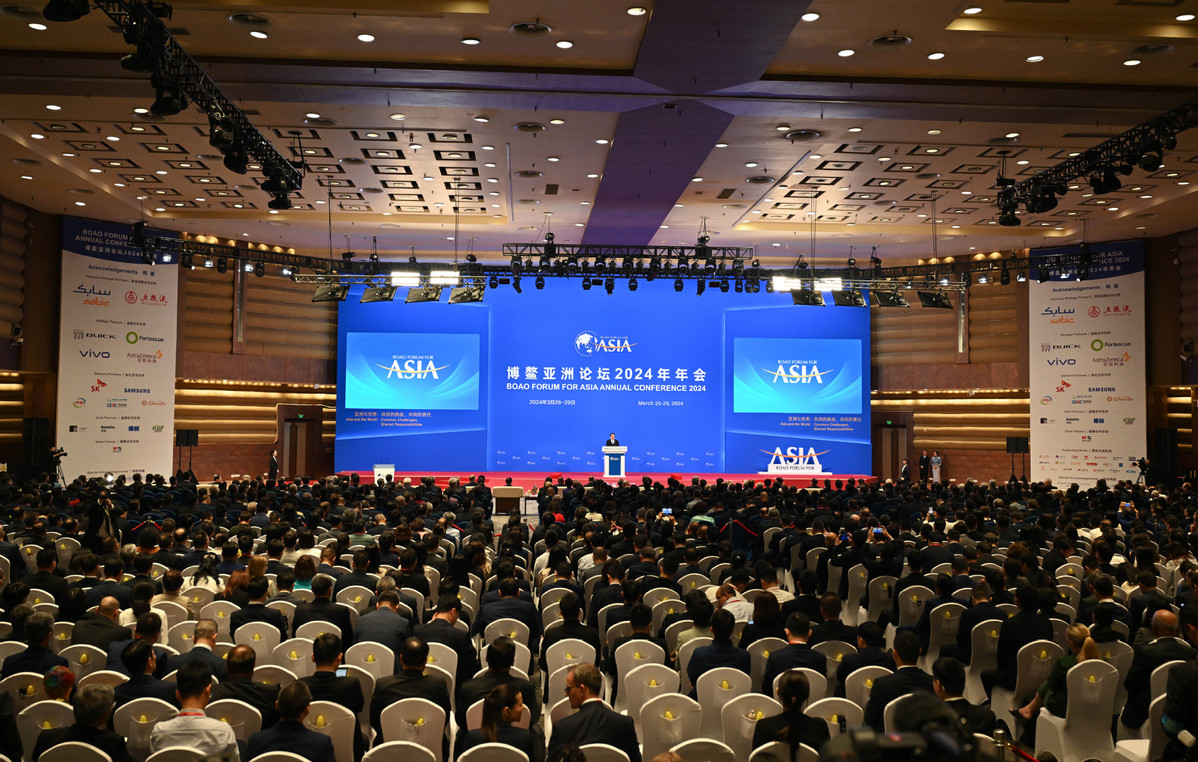
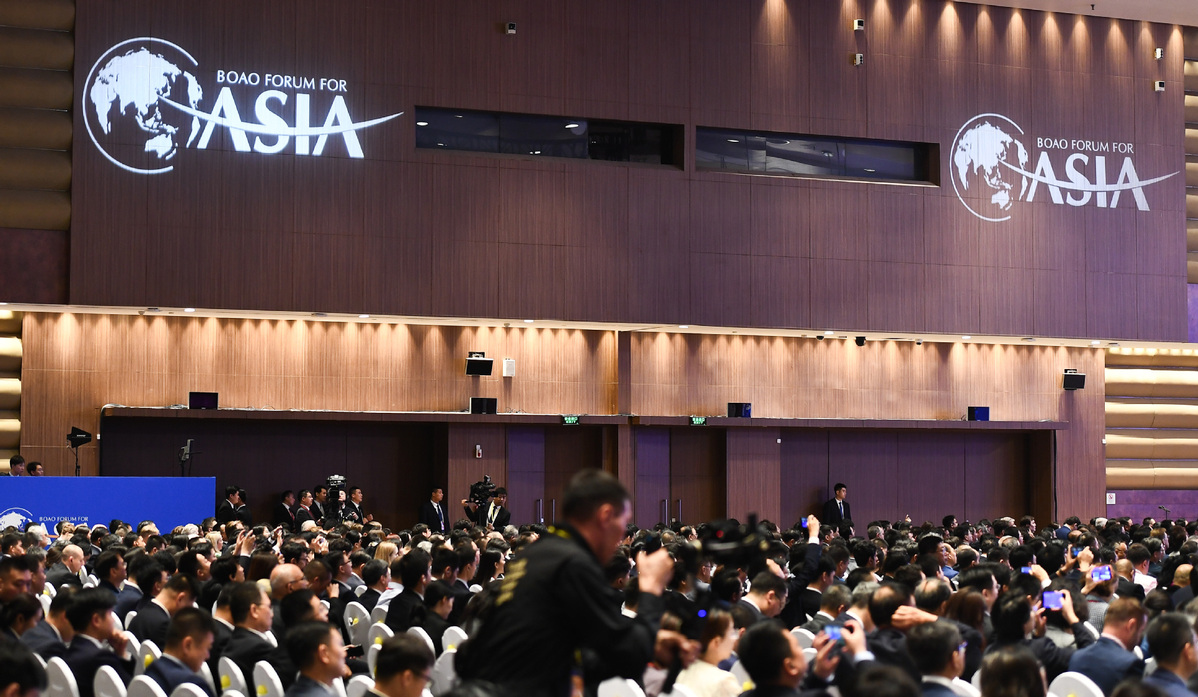
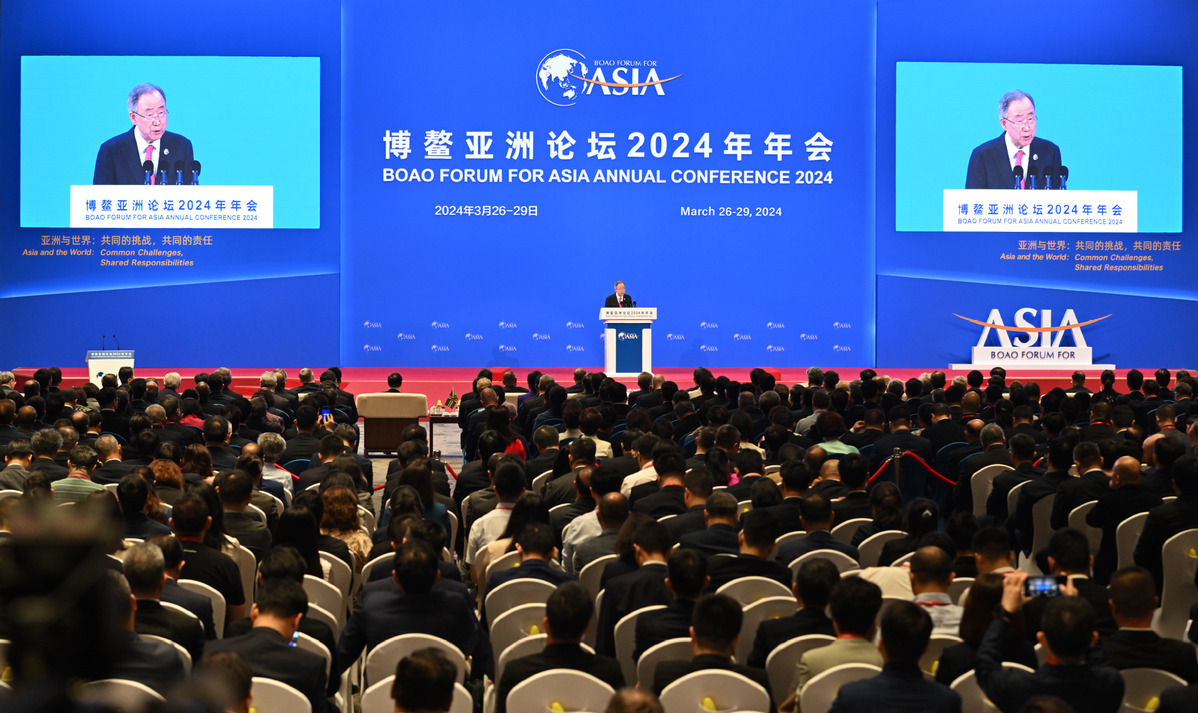
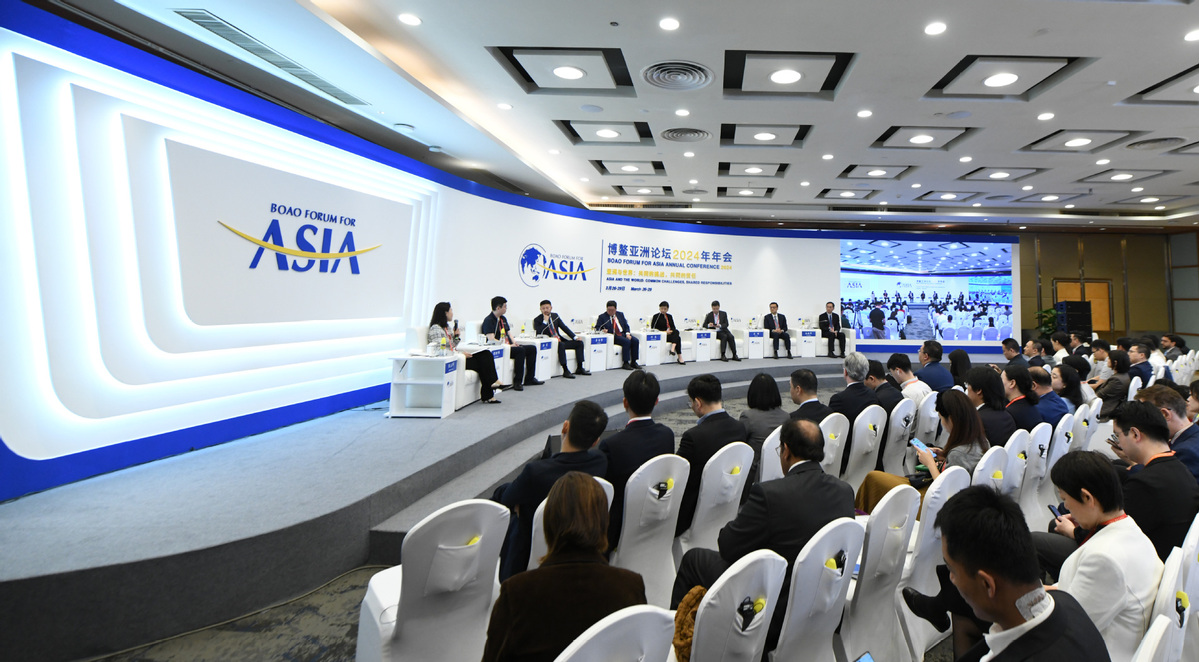
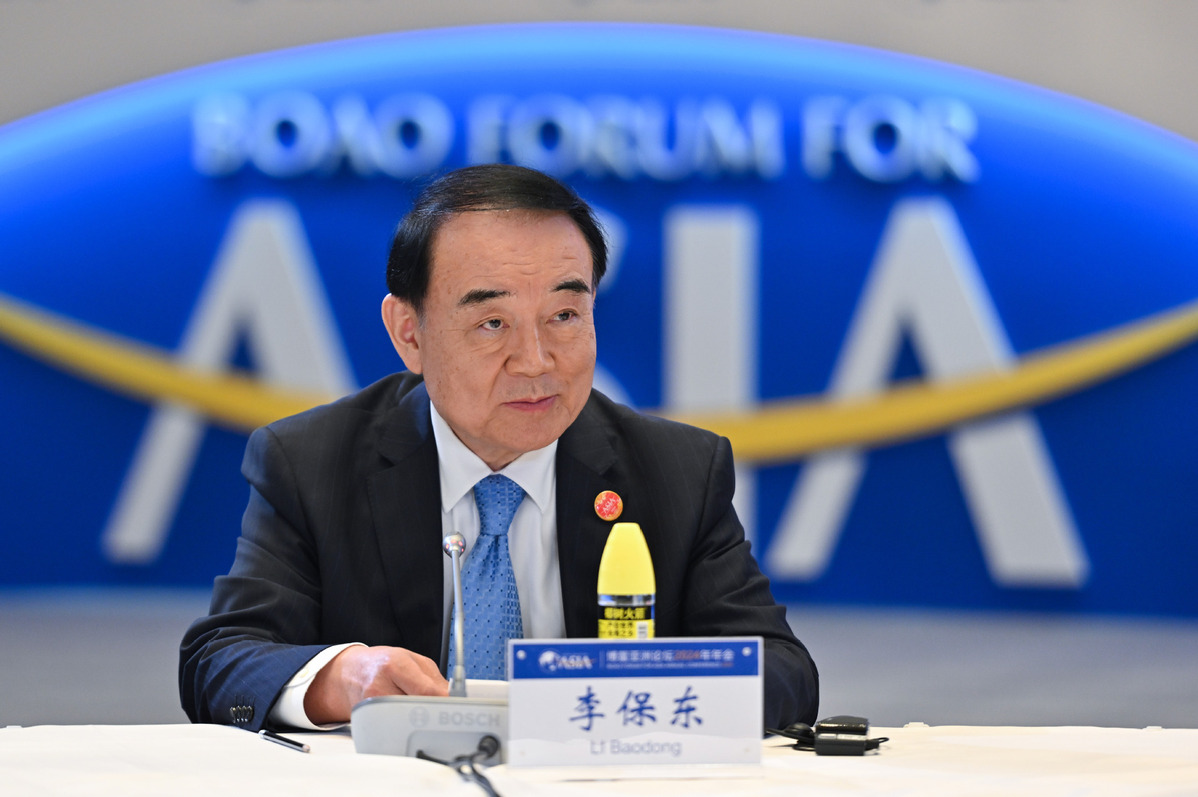
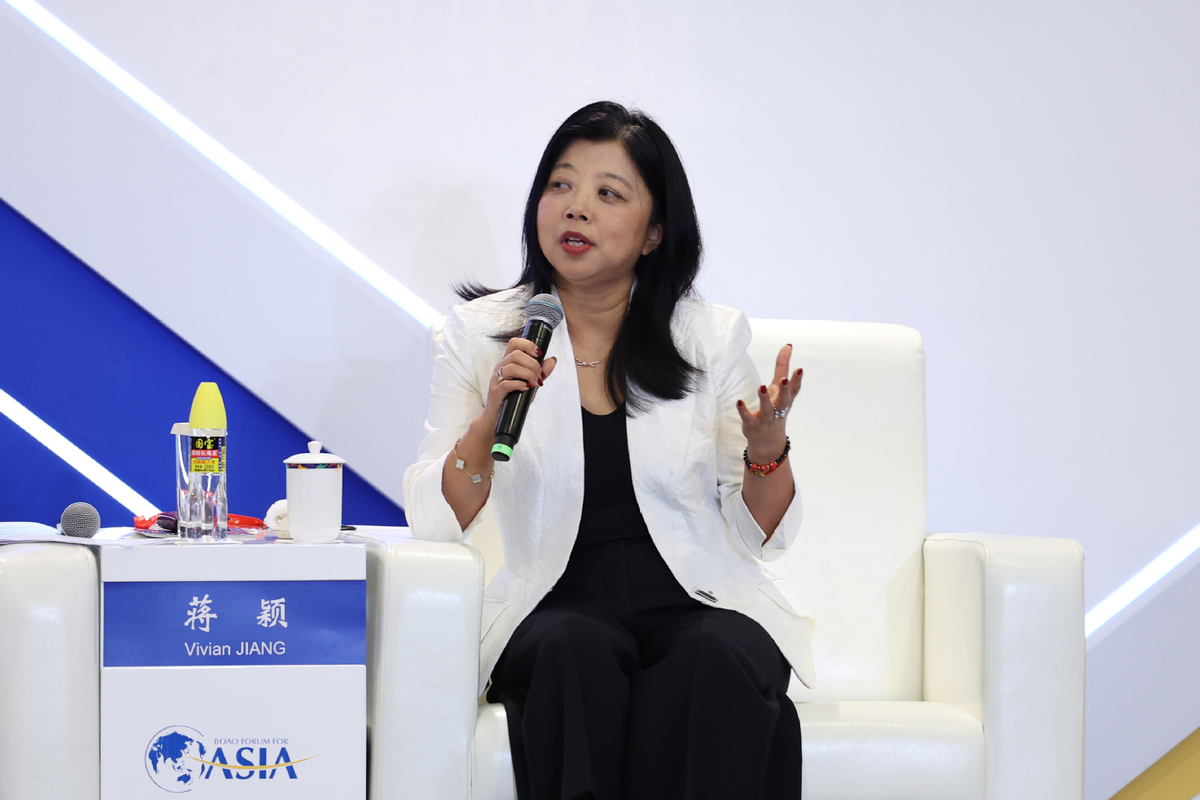
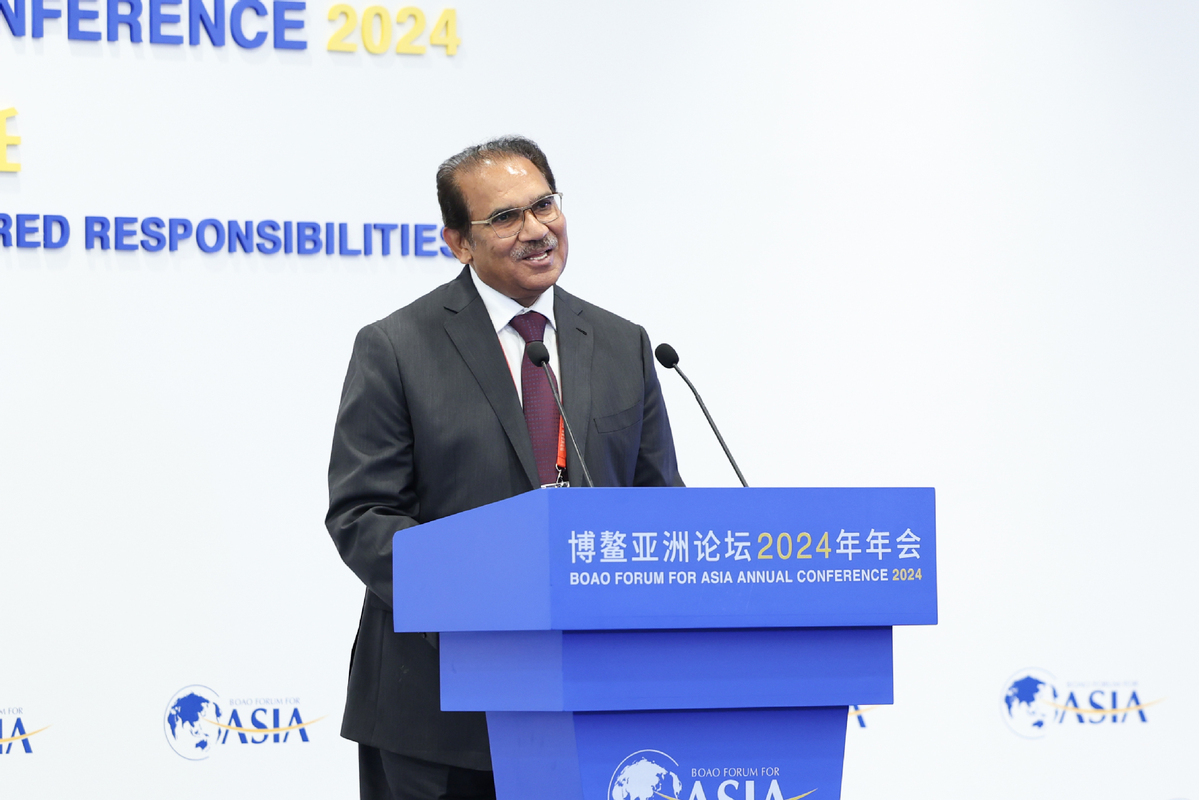
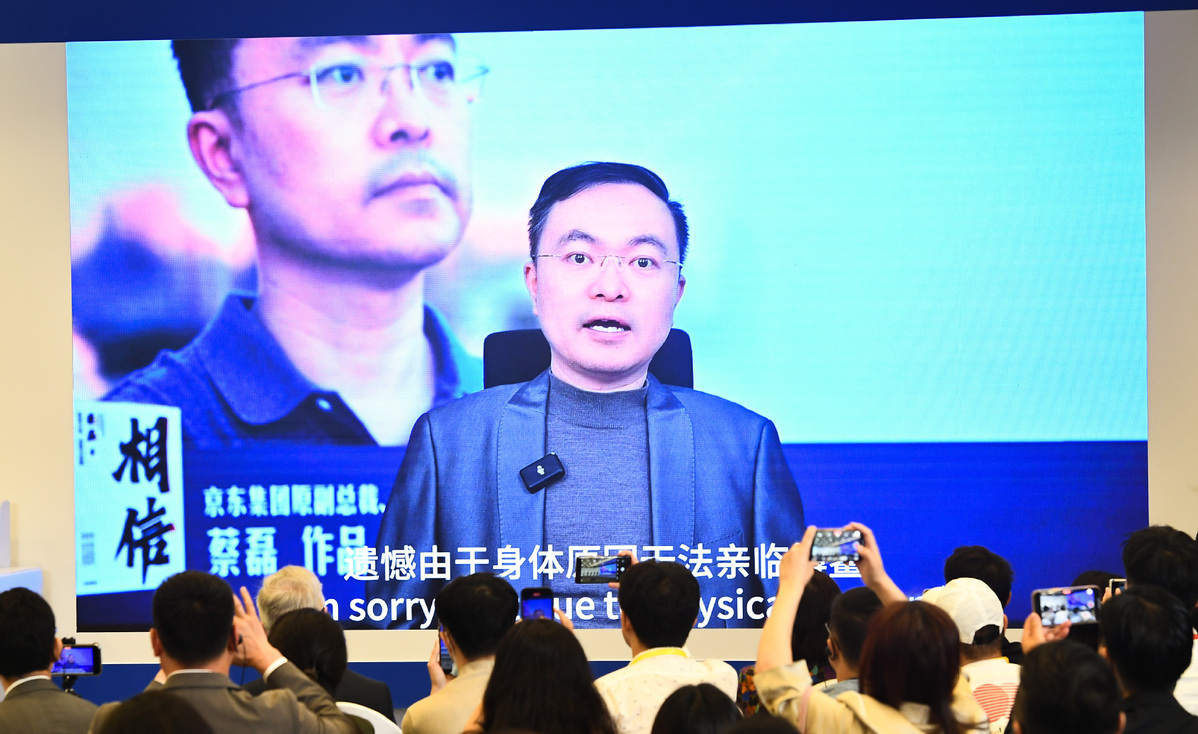
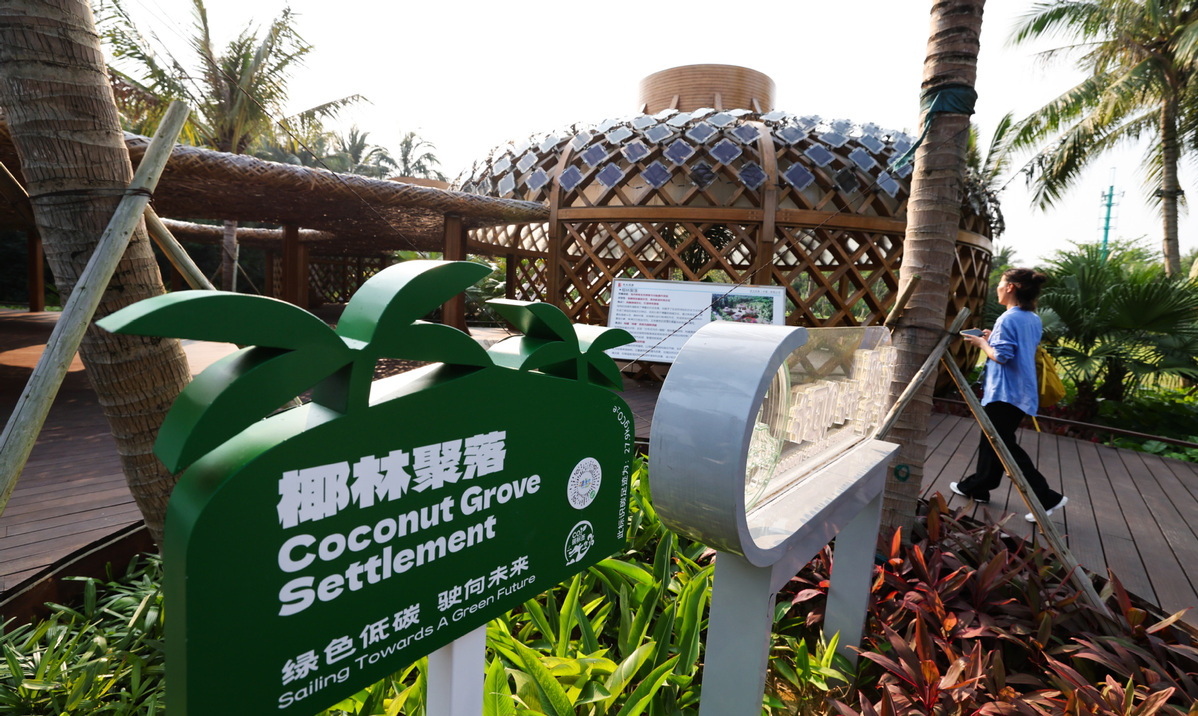
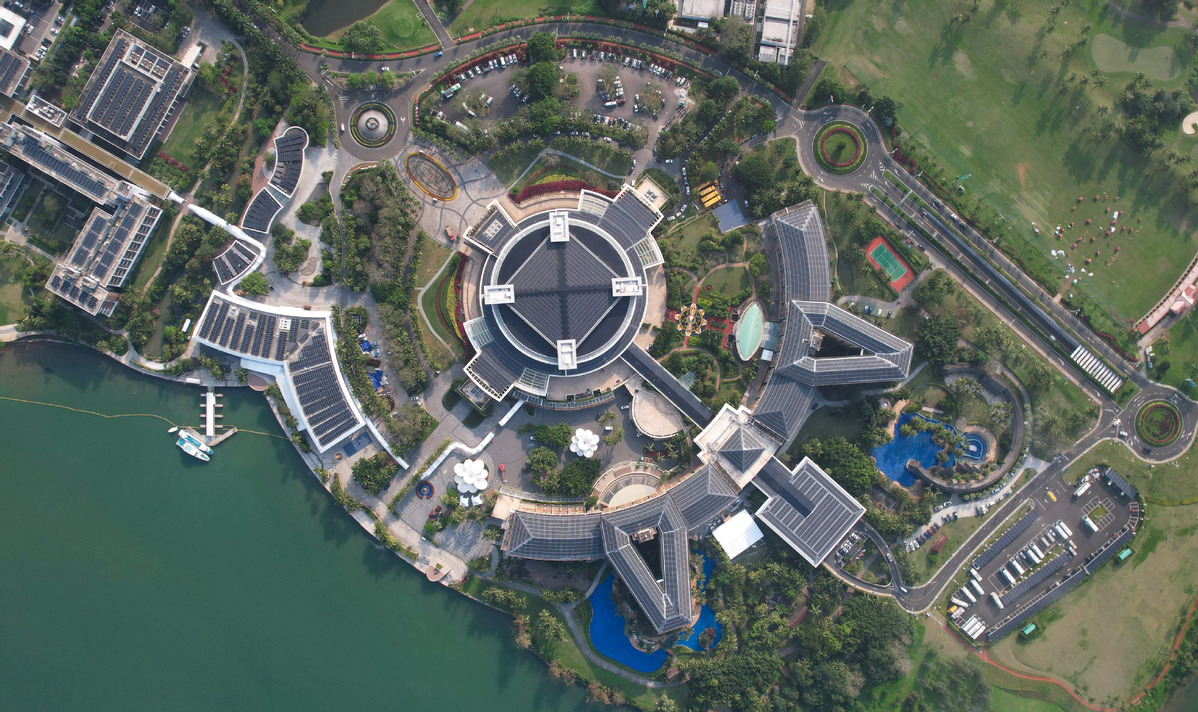
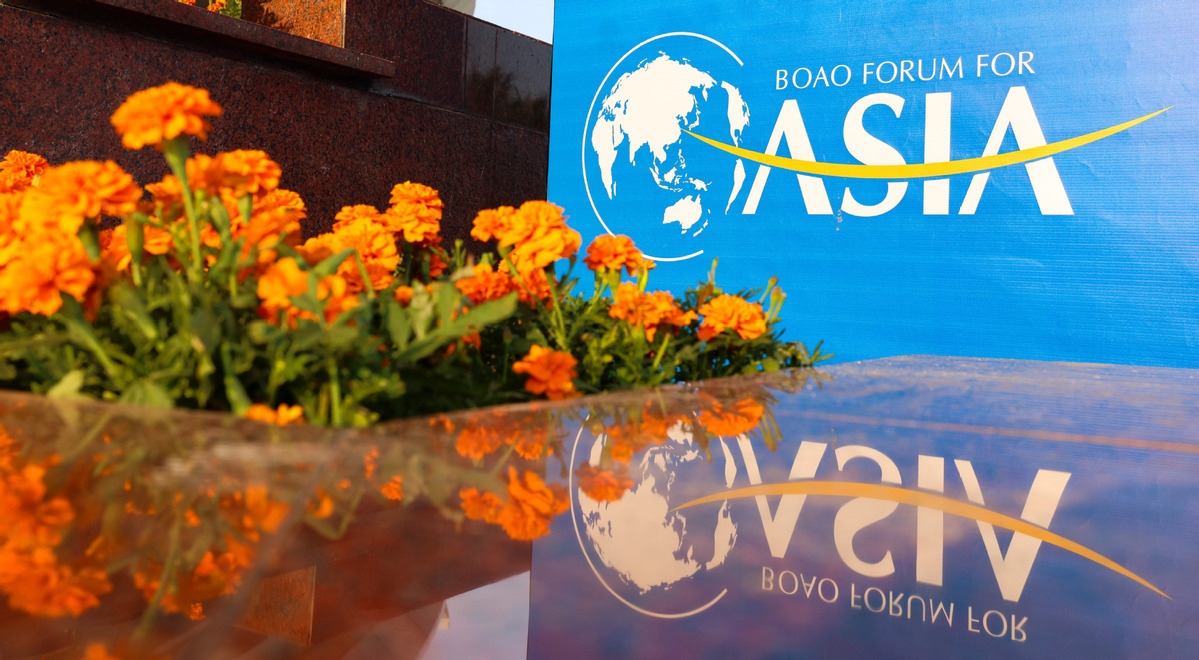
China's efforts in promoting high-standard opening-up and innovative development will create unlimited market opportunities and broad development prospects for multinational corporations, said corporate executives on the sidelines of a high-level meeting during the ongoing Boao Forum for Asia Annual Conference 2024.
Their comments followed a meeting between China's top legislator Zhao Leji and some representatives of the forum, including top executives of Chinese and foreign enterprises, in Boao in South China's Hainan province on Wednesday.
Top officials from the Ministry of Commerce, the Ministry of Industry and Information Technology, and the People's Bank of China, the country's central bank, also attended the meeting.
At the meeting, Zhao said China is taking a series of new measures to expand its high-standard opening-up and sincerely welcomes partners from all over the world.
China has the advantages of a vast market scale, robust industrial system, talent and an ecosystem that fosters innovation, as well as obvious institutional advantages. In addition, the fundamentals of China's long-term economic improvement have not changed, Zhao said.
Zhao noted that the nation advocates inclusive economic globalization, opposes various forms of unilateralism and protectionism, and is willing to closely link its own development with that of other countries.
The country will continue to promote mutually beneficial cooperation between China and foreign countries from the legal system level, safeguard the lawful rights and interests of enterprises and promote high-standard opening-up, he said.
Ban Ki-moon, chairman of the Boao Forum for Asia and former UN secretary-general, said at the meeting that China is now in a transition to growth model that put more focus on quality and sustainability. It takes vision and courage to pursue such goals, he said.
During the ongoing conference, MNC executives voiced their support for economic globalization and free trade, and expressed confidence in China's economic development prospects. They said they are willing to actively expand the market to achieve win-win outcomes.
Leon Wang, executive vice-president of AstraZeneca, a global biopharmaceutical major, said China has reiterated its determination to continuously promote international economic exchanges and interactions. "This is good news for multinational companies in China, including AstraZeneca, and will reinforce their confidence in the Chinese market."
Wang noted that cooperation is both a cornerstone for development and key to sustained innovation. "Asia has emerged as a major global force in science and innovation, and China is playing an important role in addressing the serious health challenges facing the world. We will continue to strengthen its collaboration with innovative Chinese companies and healthcare organizations to address these challenges together."
Transitioning to green electricity, low-carbon and zero-carbon solutions is crucial for sustainable growth as well as the well-being of future generations, said Dora Liu, Deloitte China deputy CEO at Boao Forum for Asia Annual Conference 2024.
At the forum, a major topic is net-zero carbon emissions, with the annual report on sustainable development having been released. It advocates for collaborative efforts among Asian countries to achieve a zero-carbon electricity era.
The report called for interconnectivity among Asian countries and regions to work together to realize green electricity. It also holds significance for China as it focuses on new quality productive forces, said Liu.
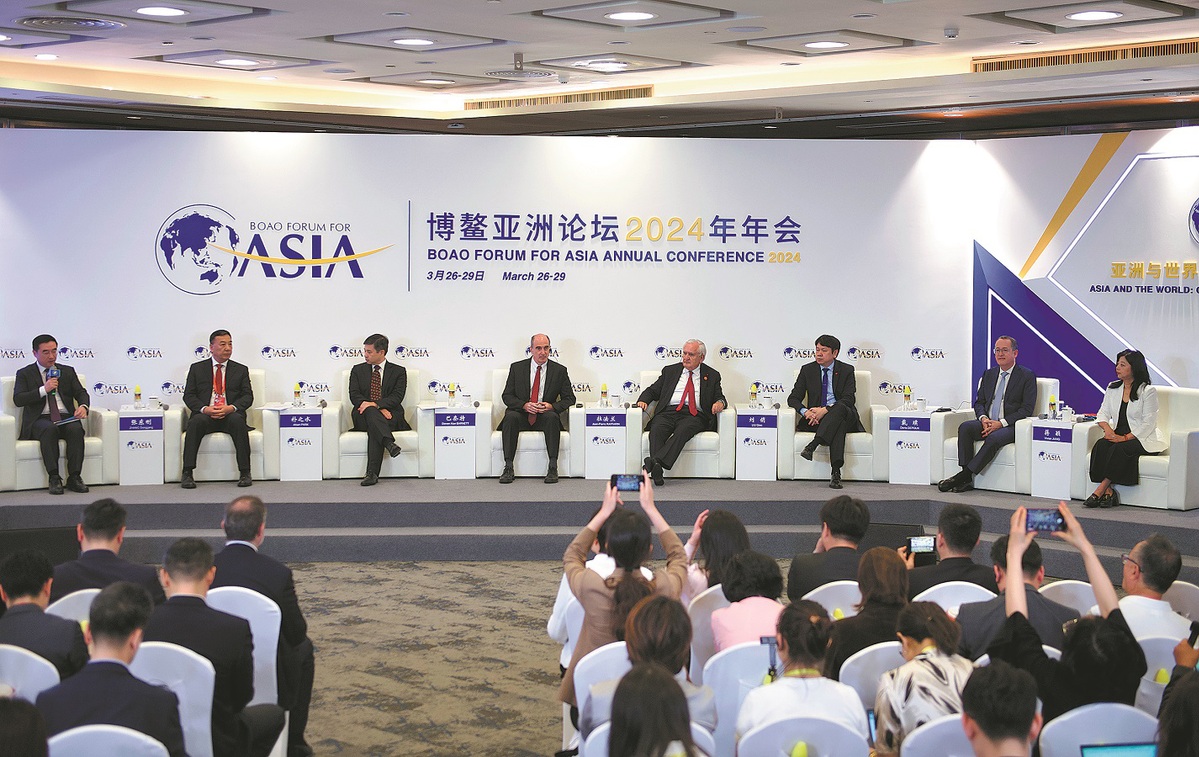
China's economy is showing signs of steady recovery with effective measures to boost domestic demand and tackle structural issues, participants attending the Boao Forum for Asia Annual Conference 2024 said on Thursday.
Looking ahead, they said boosting consumption and fostering new quality productive forces will be among key priorities for the country to support high-quality development and sustainable growth.
Citing some key economic indicators in the first two months of the year, Ben Simpfendorfer, a partner at consultancy Oliver Wyman, said the "Chinese economy is stabilizing", and he still sees some positive factors driving China's economic recovery this year.
"I think the exports are the primary positive factor," he told China Daily in an exclusive interview on Thursday. "The global economic outlook looks more promising. And the US economy appears on course to a soft landing."
He also said a cause for concern in the current environment is the ongoing correction in real estate. It is quite important to stimulate stronger consumption this year. "So, I think to see a stronger recovery this year, we need to see consumer spending accelerate."
Chinese policymakers, he said, have options to increase fiscal spending in fields like health, education and maternity care, providing more support to consumers, especially low-income families. "That might provide them with greater certainty in their household finances and greater confidence to start to spend more on other types of goods and services."
Erik Berglof, chief economist of the Asian Infrastructure Investment Bank, said he believes China needs to create clear conditions and rules on how the private sector can contribute to efforts to bolster the world's second-largest economy.
"It needs to focus on innovation and try to bring new ideas and new ways of organizing things," he said. "I think China will remain an important contributor to global growth for the foreseeable future, but it will require more efforts from the government side."
Steven Barnett, senior resident representative of the International Monetary Fund in China, said China has become the world's largest economy in terms of GDP in purchasing power parity terms, and the country's economy contributes to around one-third of the global economic growth.
He told a forum during the ongoing four-day event in Boao, Hainan province, that China's robust economic growth will significantly benefit the rest of the world.
Over the next few years, fostering new quality productive forces and keeping spending high will be key to boosting China's long-term growth — and consolidated efforts to boost consumption will also help improve people's livelihoods, he said.
Although the property sector may continue to be a drag on China's economic growth, the structural adjustment in the sector will foster a healthy and better future for the sector's development, which will benefit the country's long-term development, said Zhu Min, vice-chairman of the China Center for International Economic Exchanges.
Returning to the negotiation table and exploring means of cooperation is the only feasible and right path to reduce risk and maintain peace and stability in the South China Sea, and it is also the way for regional countries to get along with each other, observers said on Thursday.
They made the remarks during a panel discussion at the Boao Forum for Asia Annual Conference 2024 in Boao, Hainan province, after they agreed that as a geopolitical hot spot, the South China Sea situation is evolving in a larger context of intensifying rivalries, low trust and rising tension.
Nguyen Hung Son, vice-president of the Diplomatic Academy of Vietnam, said that with the world grappling with uncertainties, managing the South China Sea has become more challenging. "We must work together ... to reduce confusion and minimize miscalculation by strengthening strategic communication and dialogue, and we must not send the wrong signal to the other side," he said.
Stephen Orlins, president of the National Committee on US-China Relations, said the South China Sea is one of the most important waterways in the world, and any disruption in the area has enormous global implications. "The world can't afford to have an unstable and unproductive South China Sea," he said, adding that it requires diplomatic efforts to develop mechanisms to address disagreements and allow various parties to jointly benefit from the waterway.
Wu Shicun, chairman of the Huayang Research Center for Maritime Cooperation and Ocean Governance and founding president of the National Institute for South China Sea Studies, said the United States, a major external force, has been encouraging its allies to stir up provocations in the South China Sea.
"Washington supports whoever confronts China in the area, and it is the very reason why Manila frequently causes troubles in the Ren'ai Reef," he said, adding that the US should embrace a neutral policy regarding the South China Sea and avoid picking sides.
Dino Patti Djalal, founder and chairman of the Foreign Policy Community of Indonesia, said the South China Sea is a rare topic on which its claimants talk regularly based on a clear pathway, which is the Code of Conduct in the South China Sea. He said that exercising self-restraint is very important. "If you want stability, cooperation, trust and confidence, all claimants need to avoid actions that will provoke responses from other claimants."
Djalal added that cooperation has an inverse relationship with conflict. "The more you cooperate, the less the potential of conflict."
Yang Renhuo, deputy director-general of the Department of Boundary and Ocean Affairs of the Foreign Ministry, said that maritime disputes and differences are not the whole story of the relations between regional countries in the South China Sea, and these should not dilute or even drown the mainstream of friendly cooperation among regional countries.
China is willing to cooperate with members of the Association of Southeast Asian Nations in less sensitive areas such as ensuring environmental protection, advancing scientific research, coordinating maritime search and rescue, combating transnational maritime crimes, and ensuring maritime navigation security, Yang added.
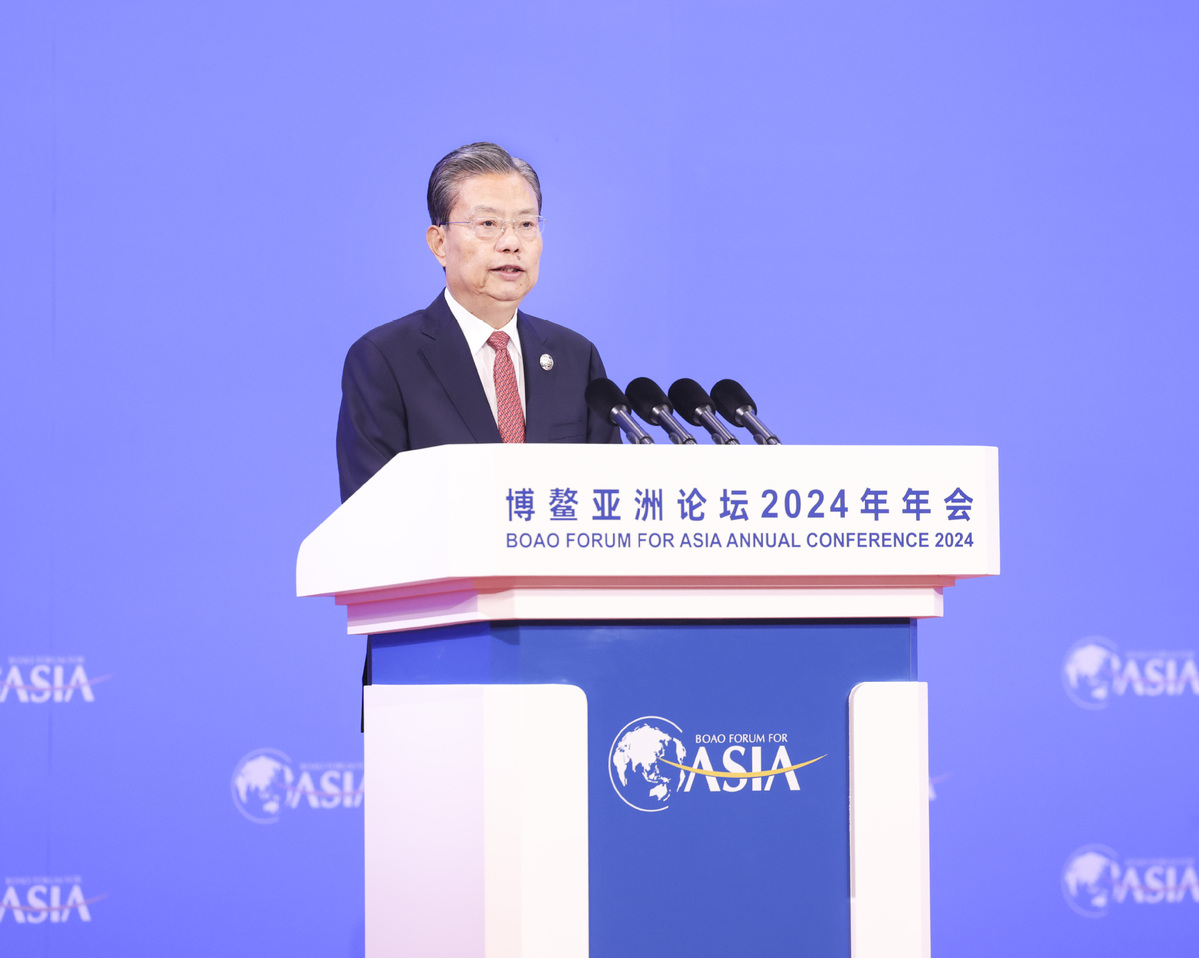
In order to open up further to the world, China will build on a first-class business environment that is market-oriented, based on rule of law and internationalized, top legislator Zhao Leji said, adding that the country will also shorten the negative list for foreign investment.
He made the pledge while delivering the keynote speech at the opening ceremony of the Boao Forum for Asia Annual Conference 2024 in Boao, Hainan province, on Thursday.
The country will comprehensively remove restrictions on the access of foreign investment to the manufacturing sector, and further implement national treatment for foreign enterprises, said Zhao, chairman of the Standing Committee of the National People's Congress, China's top legislature.
China will also offer more convenience for foreigners coming to China for work, study and travel, he added.
The event on Thursday attracted around 1,500 participants, including political leaders, business executives and scholars from over 60 countries.
Zhao said China is willing to strengthen cooperation with other countries in high-tech innovation and will further promote open, green development.
The nation's green economy is expected to unleash an investment and consumption market worth 10 trillion yuan ($1.38 trillion) a year, he added.
Noting that Hainan is building a free trade port with Chinese characteristics, Zhao welcomed people to come to Hainan to invest and operate businesses.
Leon Wang, executive vice-president of global biopharmaceutical giant AstraZeneca, said Zhao's speech emphasized China's determination to promote higher-level opening-up, which will bring huge opportunities for multinationals like his company.
"As mentioned in the speech, Asia has become an important global force in the field of science and innovation, and China plays an important role in responding to severe health challenges that face the world," Wang said.
Marc Horn, president of science and technology company Merck China, said, "This country is very resilient and has shown that it can transform very rapidly, on a good trajectory for transformation.
"The new quality productive forces is a new area where I think there's a lot of growth opportunity for us, so we want to continue doing investments in China," Horn added.
In his speech, Zhao noted that the expected target for China's economic growth this year is around 5 percent, and the country will continue to take the lead in growth among major global economies.
China will inject strong momentum into the world's economic recovery and provide more opportunities for the development of other countries, especially neighboring Asian countries, he said.
Zhang Donggang, Party secretary of Renmin University of China, said Zhao's speech shows that the Chinese government has put more emphasis on the quality of economic growth rather than simply pursuing greater speed.
"China's economic growth target, which is higher than those of many developed economies, sent a strong signal to the outside world that the Chinese economy is resilient, has potential and development prospects, and can provide strong support for world economic recovery," Zhang said.
"It will also help the country achieve high-quality development through structural adjustment and industrial upgrading, and further contribute to more sustainable and balanced economic development," he added.
In his speech, Zhao said the building of a community with a shared future for mankind has grown from a Chinese initiative to a global action, and has evolved from a beautiful vision to an enriched practice.
He called on Asian countries to oppose power politics and hegemonic behavior, and to maintain a regional order that balances the aspirations of various parties and accommodates the interests of each party.
Asian nations should keep the region's long-term stability in their own hands, and work together to facilitate Asia's development, advance its openness and promote Asian civilization, he said.
Sun Jisheng, a professor and vice-president of China Foreign Affairs University, said that China's development of its relations with neighboring countries, based on its philosophy of "amity, sincerity, mutual benefit and inclusiveness", has "played an important role in peace and stability in its neighborhood".
"In addition to its neighborhood, China has endeavored to shoulder the duties of a major country in the world and contribute to the peace and stability of the world," Sun said.
Contact the writers at
zhangyunbi@chinadaily.com.cn
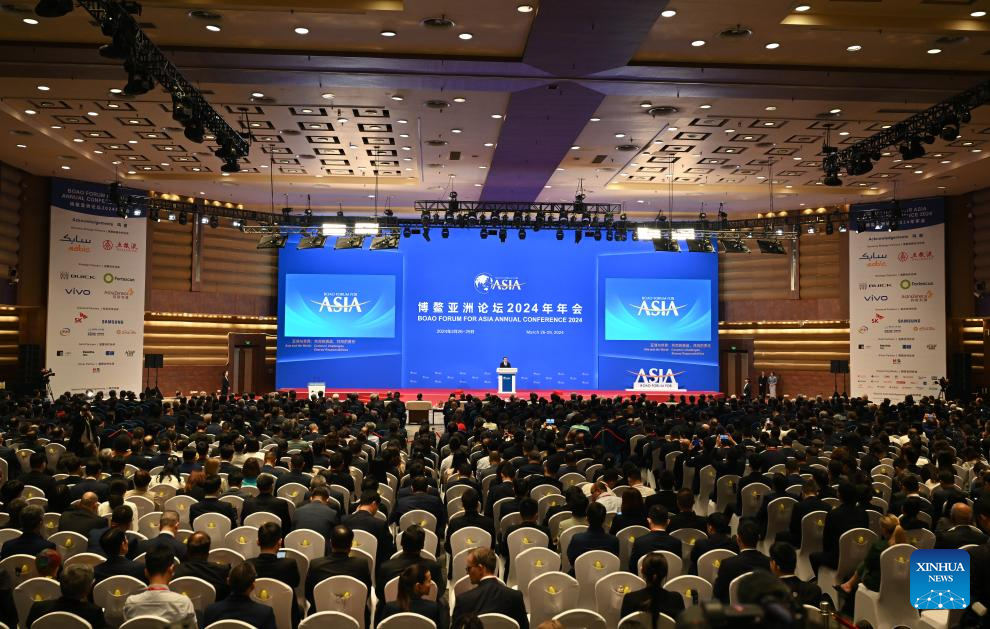
On March 28, the opening ceremony of the Boao Forum for Asia 2024 Annual Conference was held in Boao, South China's Hainan province.
Scheduled for March 26-29, the conference attracted more than 1,100 journalists from approximately 40 countries and regions, in addition to nearly 2,000 delegates from over 60 countries and regions. It serves as a platform for high-level dialogue, facilitating comprehensive exchanges and broad cooperation among all participating entities.
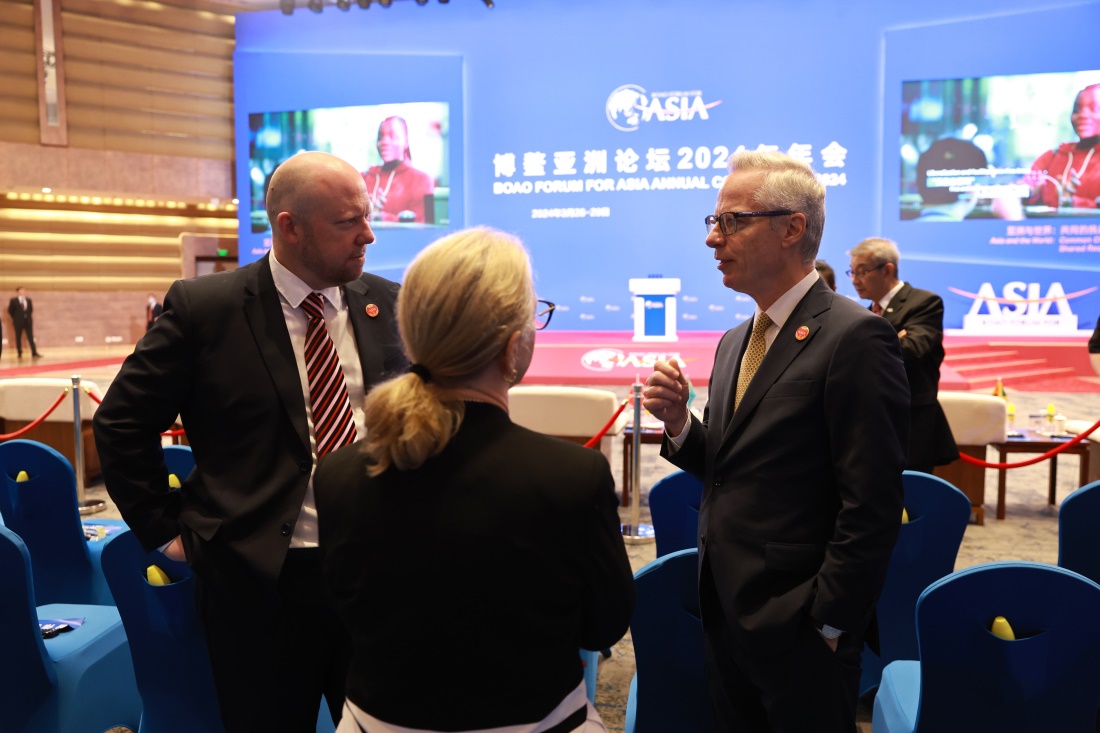
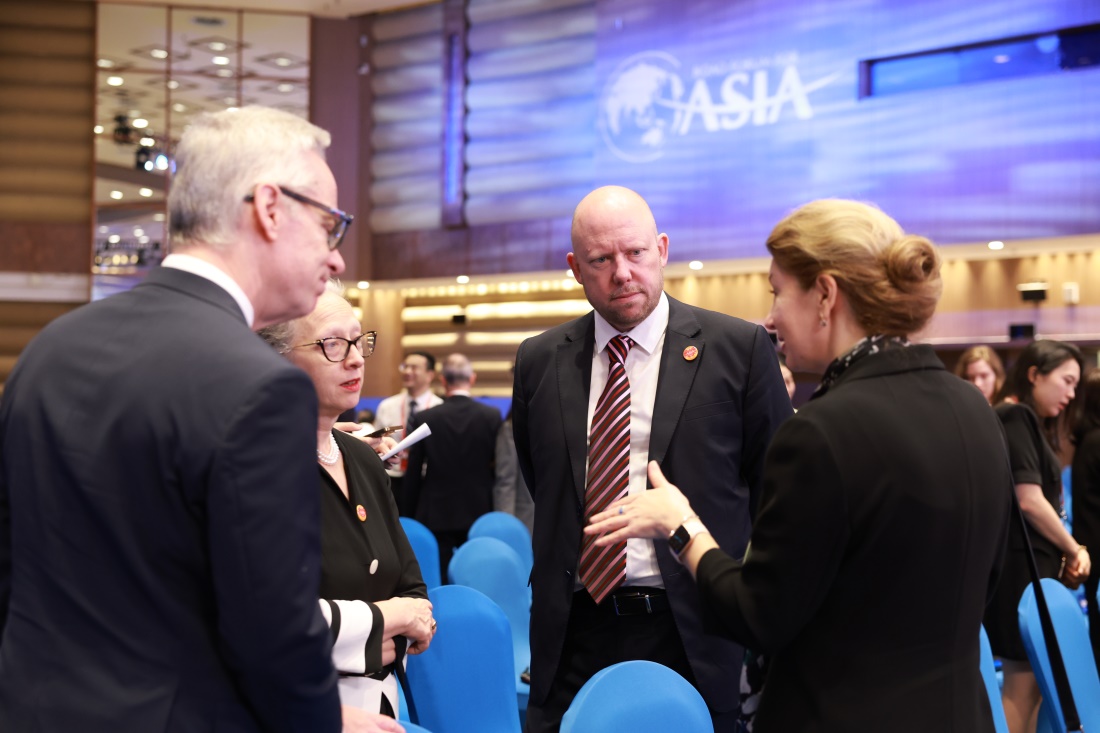
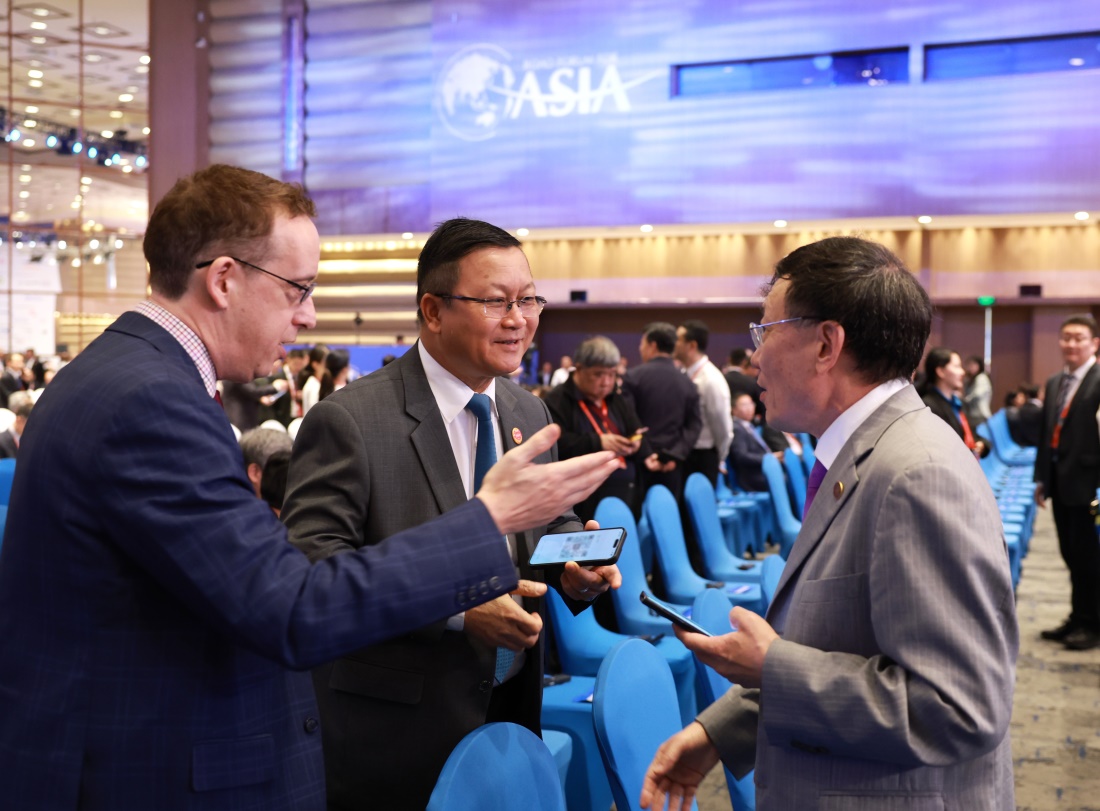
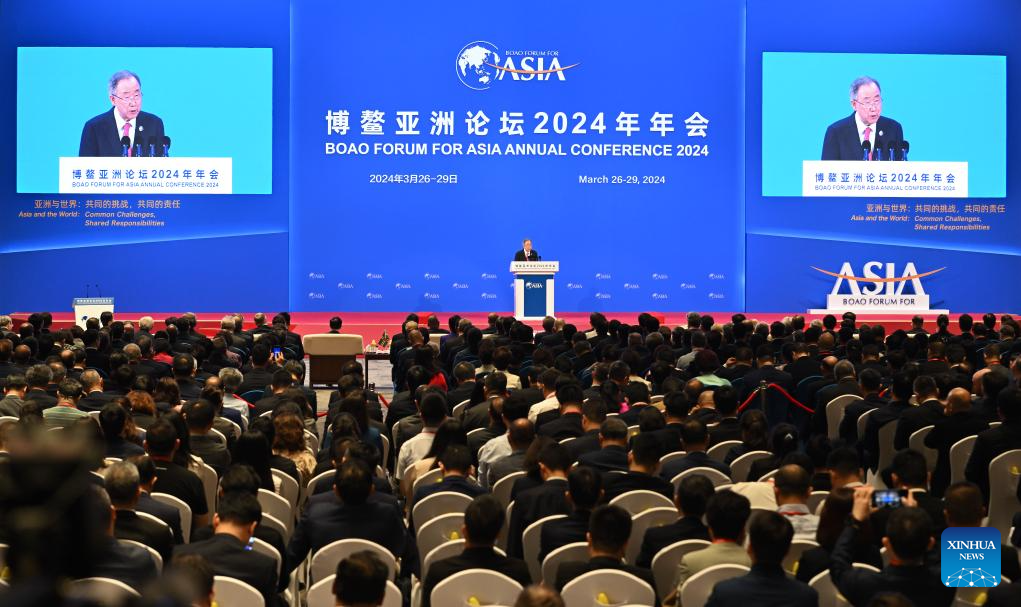
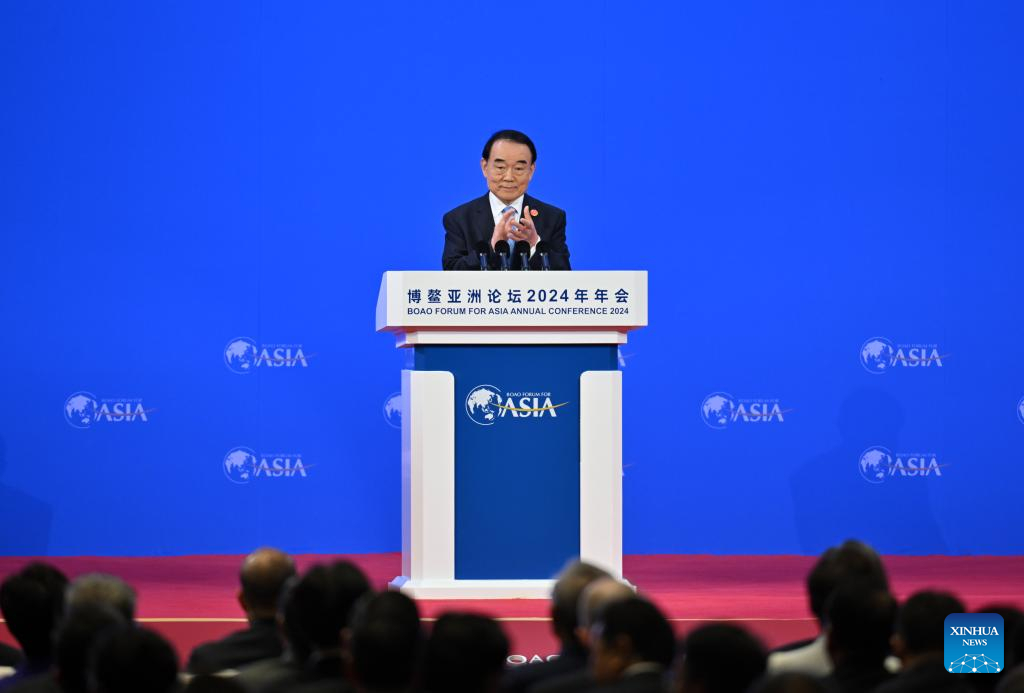
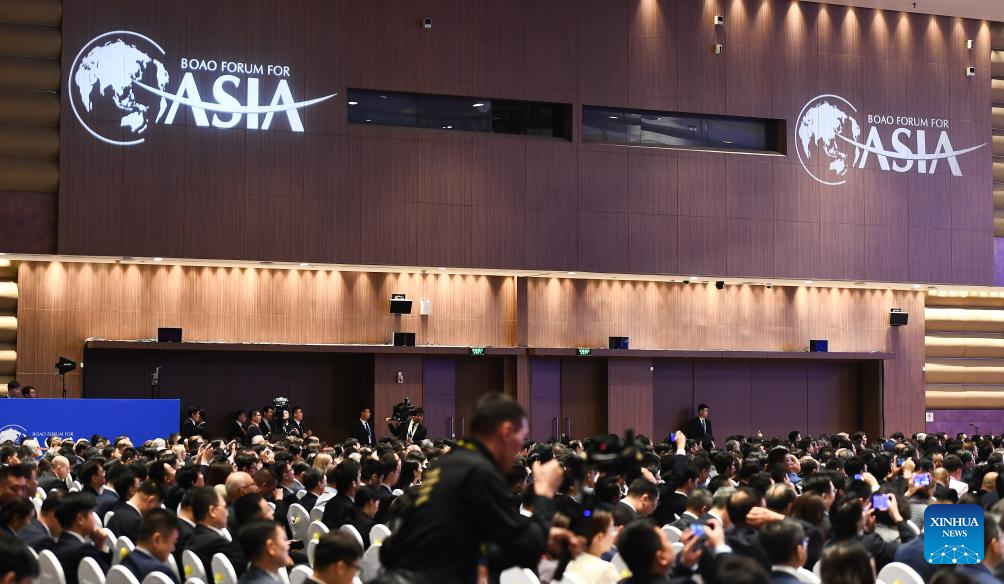
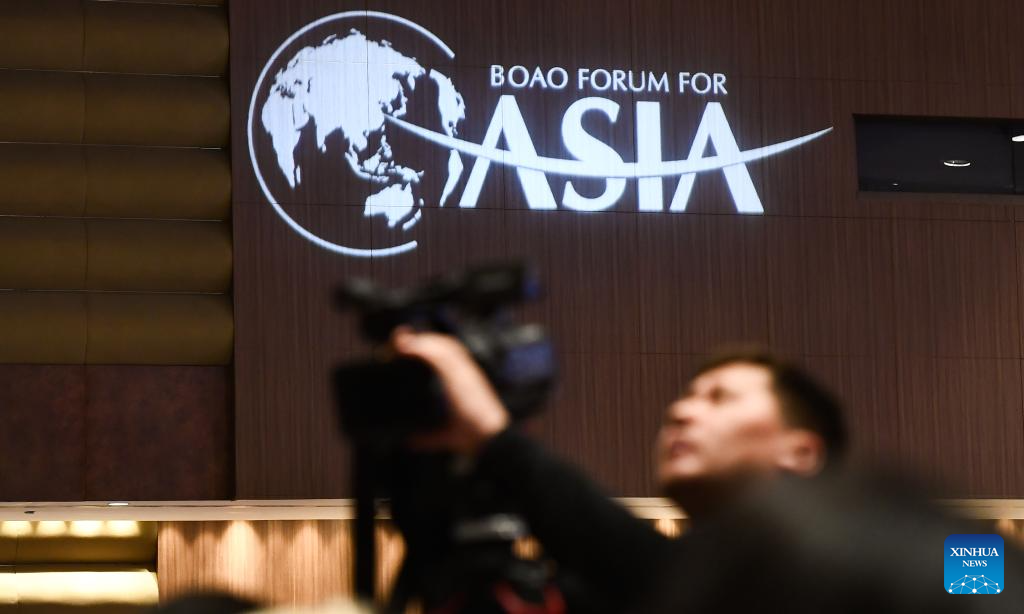
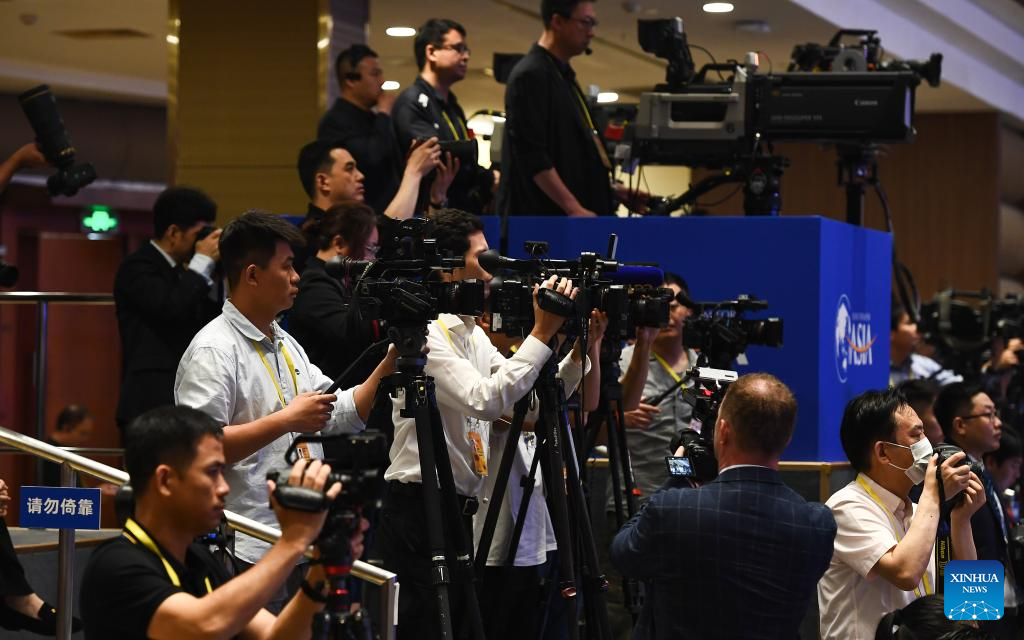
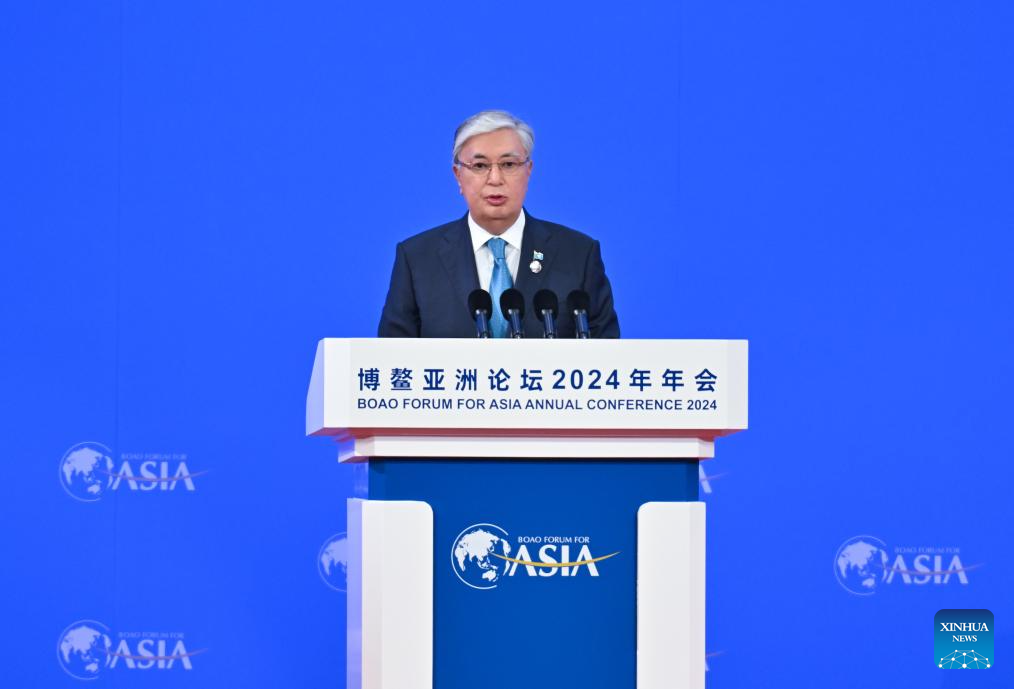
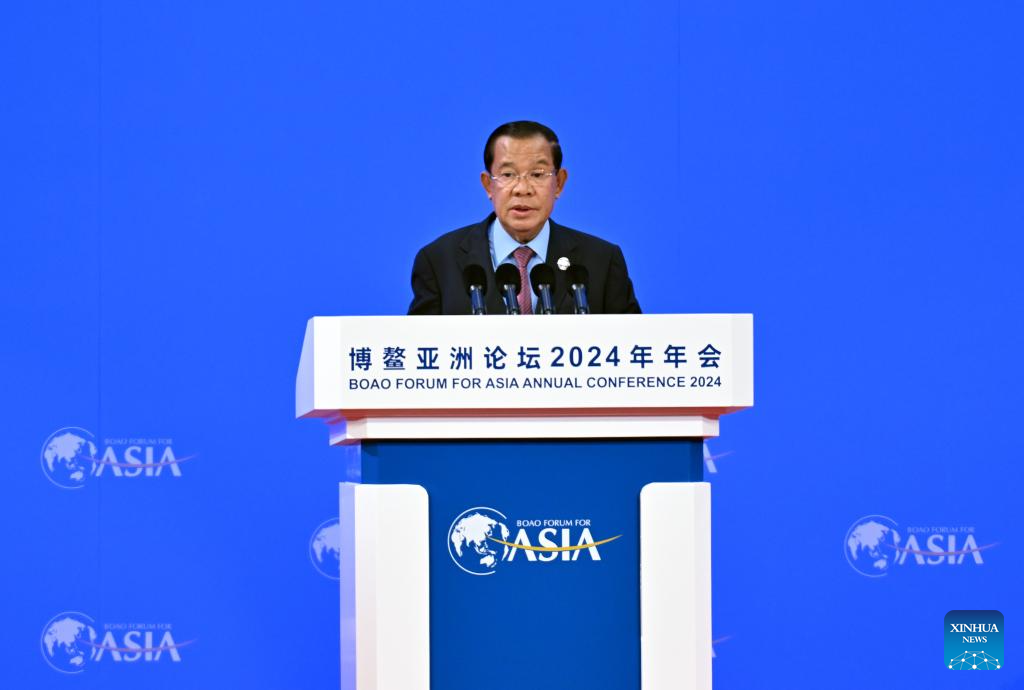
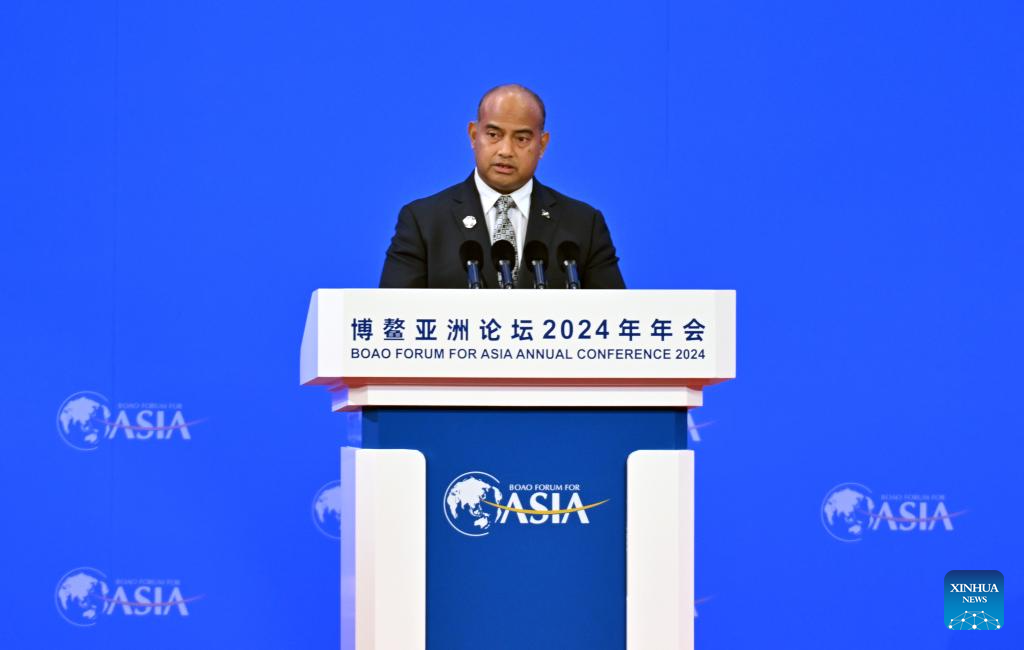
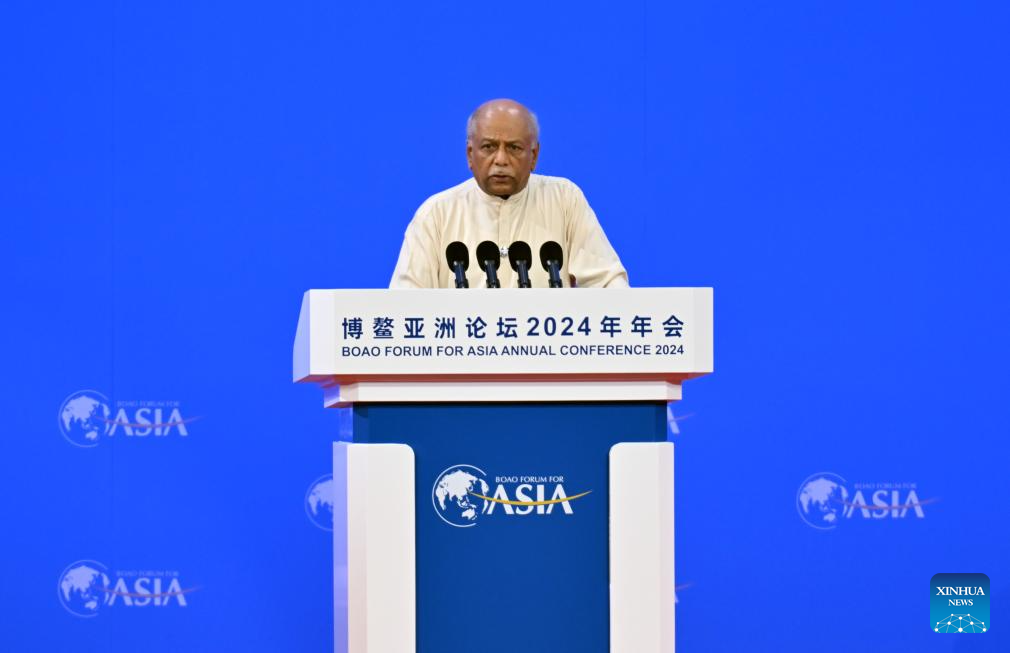
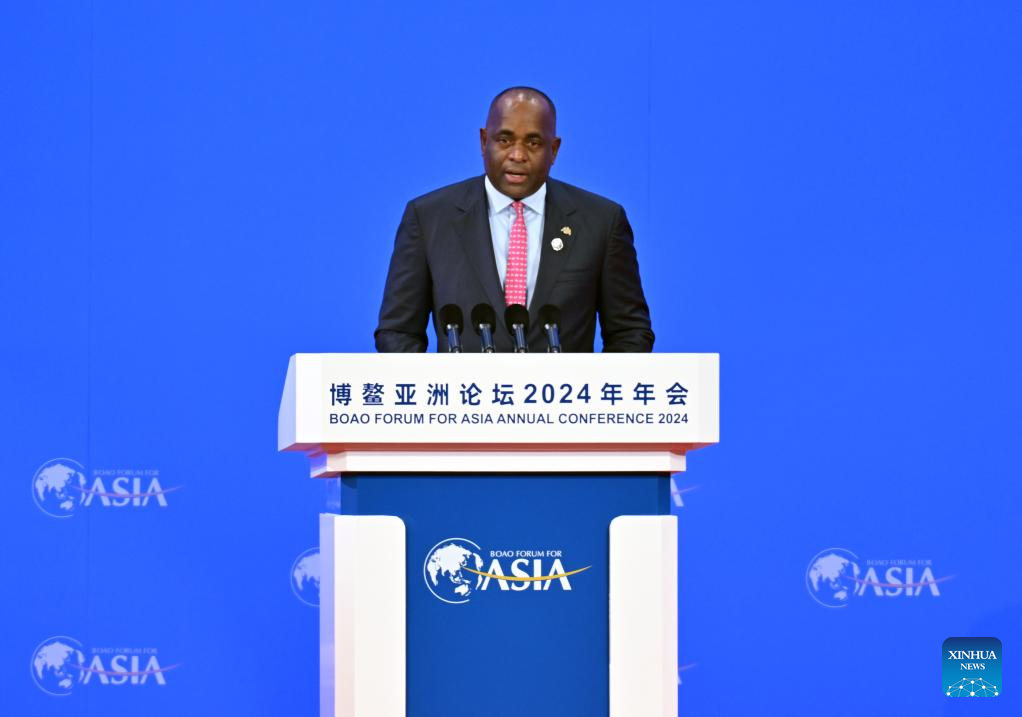
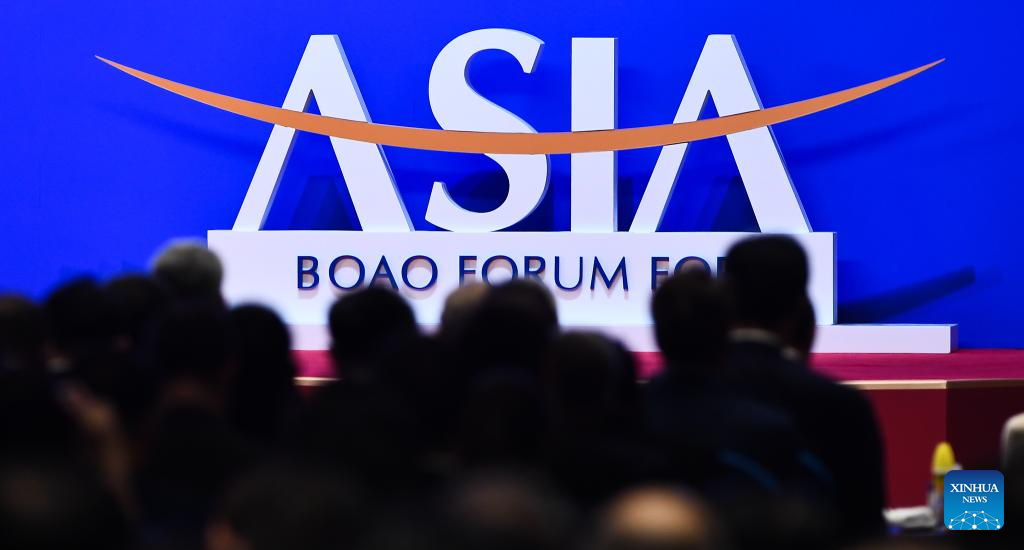
"Regardless of which stage of the economic cycle we are in, Australian Capital Equity remains committed to our investments in China," said Joe He, managing director and CEO of Australian Capital Equity Greater China, during an exclusive interview with China Daily at the ongoing Boao Forum for Asia Annual Conference 2024.
Over the past 30 years, it has been fully demonstrated that the economic globalization system has brought sustained economic prosperity to the world, he said.
He also shared his opinion on the Chinese market from the perspective of a multinational corporation. For more details, please watch the video.
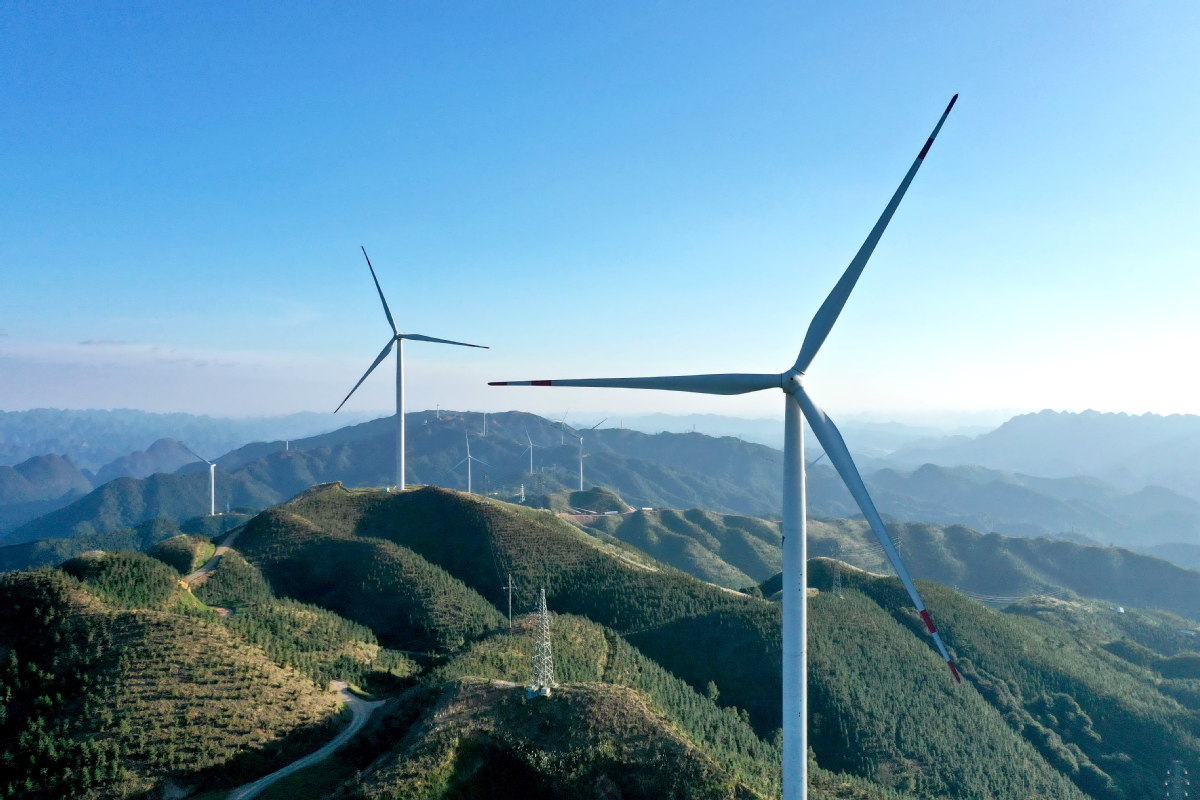
BOAO, Hainan - China's green and digital innovation is injecting great momentum into its efforts to develop new quality productive forces and promote high-quality development.
The remarks were made by government officials, entrepreneurs and scholars at a sideline forum during the Boao Forum for Asia (BFA) Annual Conference 2024, underway in Boao in South China's Hainan province from March 26 to 29.
New quality productive forces refer to advanced productivity freed from traditional economic growth modes and productivity development paths. It features high technology, high efficiency and high quality, and is in line with the new development philosophy.
As a major cooperation partner of BFA, China Energy Engineering Corporation Limited, a Global Fortune 500 company, has been participating in the annual conference for years, sharing innovation outcomes as well as green and low-carbon development solutions with global participants.
Noting that the goal of new quality productive forces is aligned with the company's growth strategy, Song Hailiang, chairman of the company, said at the sub-forum that innovation is the core driving force of new quality productive forces and an engine for China's high-quality development.
The company has been actively pursuing innovation to develop new quality productive forces and foster new strategic industries, Song added. In 2023 alone, the company invested nearly 13 billion yuan ($1.83 billion) in research and development in power supply, power grid, new energy, energy storage, hydrogen energy, seawater desalination, and other fields.
Similar views were shared by Liu Yong, chairman and founder of DAS Solar, a Chinese high-tech enterprise that exemplifies innovation in the photovoltaic industry. According to him, the outstanding element of new quality productive forces should be innovation, as it is only through innovation that enterprises can attain core competitiveness.
"We are also pursuing innovation in the production and operation model," said Liu, noting that the company has built a fully intelligent and digital factory, realizing the whole-process smart production.
In addition to the energy sector, China's transportation industry has also actively pursued innovation during its development journey over the years.
"China's transportation industry has made substantial headway since the reform and opening up. We have built the world's largest high-speed railway and expressway networks, as well as a world-class port cluster," said Li Yang, China's vice minister of transport. "The development of such huge transportation facilities is inseparable from technological innovation."
In recent years, China has also made vigorous efforts in green transition, injecting fresh impetus into its high-quality development while steadfastly pursuing its dual carbon goals of peaking carbon emissions by 2030 and reaching carbon neutrality by 2060.
China's dual carbon goals have put forward new challenges to the science and technology innovation in the energy sector, Gao Xiang, an academician at the Chinese Academy of Engineering, said at the forum.
Gao added that under the vision of carbon neutrality in the future, the energy structure will undergo tremendous changes and new technologies will play a significant role in promoting energy and industry transition and achieving high-quality development.
China is also sharing its high-quality development experience with other countries.
"China has done considerable work in energy and transportation innovation. China pursues green, innovative and high-quality development while achieving rapid economic growth," said Zafar Uddin Mahmood, policy advisor to the Secretary General of BFA.
For years, Pakistan has been engaged in cooperation with China under the Belt and Road Initiative, with Chinese companies helping a lot in the development of Pakistan's energy and transportation sectors, Mahmood noted.
To share the fruits of China's high-quality development, Chinese companies have offered extensive expertise in industry development, technological cooperation and energy sharing to global partners, Song said.
Last year, China Energy Engineering secured new overseas contracts worth over 280 billion yuan. In the past five years, contracts worth more than 500 billion yuan have been signed with Belt and Road partner countries and regions.
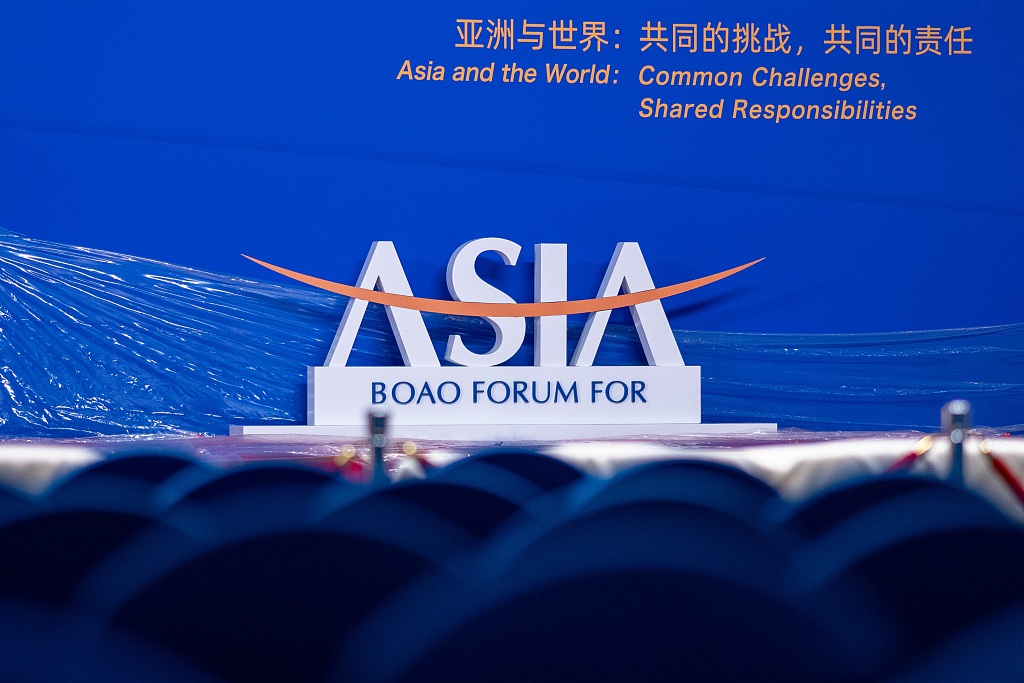
MACAO - China's economic landscape is displaying a stable and diversified trend, said Maggie Xiaoqing Fu, a professor at the University of Macao, with positive prospects for the around 5 percent GDP growth target announced during the "two sessions."
The ongoing supply-side structural reforms are pivotal in optimizing the economic structure, the professor in finance and business economics told Xinhua, adding that an increasing proportion of service and high-tech industries can inject new momentum into economic growth.
She said in an interview ahead of the Boao Forum for Asia Annual Conference 2024 that China has the advantage of concentrating efforts to accomplish major tasks. "It can not only adjust across cycles but also counter-cyclically regulate its economy."
Fu also explained how the "new quality productive forces," a new concept in China's development, is poised to accelerate growth across the region.
"By harnessing new technologies, industries, and formats, the Chinese economy can accelerate industrial upgrading, enhance innovation capabilities, and promote regional economic integration," she said, noting that it will also create a more open, inclusive, and beneficial economic pattern in the Asian region.
On innovation and China's focus on digitalization and green development, she said the rapid development in sectors such as solar photovoltaics, electric vehicles, and lithium batteries elevates China's position in the global industrial and value chains and provides robust support for global efforts to address climate change challenges.
As green development is a key measure to address global climate change, she highlighted the importance of international cooperation. The green initiatives undertaken by other Asian countries, from Singapore's Green Plan 2030 to India's investment in renewable energy, show a collective commitment to sustainable growth, she said.
Fu envisioned deeper cooperation through strengthened top-level communication, fostering green industries, and reforming global environmental governance to achieve collective green development.
